
#include <eTess2.h>


Public Member Functions | |
| eHalfEdge (ePoint *a, ePoint *b, eWall *w=NULL) | |
| void | SetWall (eWall *w) |
| void | ClearWall (void) |
| void | SetOther (eHalfEdge *e) |
| void | Destroy () |
| REAL | Ratio (const eCoord &c) const |
| eCoord | Vec () const |
| bool | Movable () const |
| bool | Splittable () const |
| void | Split (eHalfEdge *&e1, eHalfEdge *&e2, ePoint *s) |
| eCoord | IntersectWithCareless (const eHalfEdge *e2) const |
| ePoint * | IntersectWith (const eHalfEdge *e2) const |
| void | CopyIntoGrid (eGrid *grid, bool change_grid=1) |
| bool | Simplify (eGrid *grid) |
| void | Print (std::ostream &s) const |
| ePoint * | Point () const |
| eFace * | Face () const |
| eHalfEdge * | Other () const |
| eHalfEdge * | Next () const |
| eWall * | CrossesNewWall (const eGrid *grid) const |
Static Public Member Functions | |
| static void | FindPath (const eCoord &originPoint, const eFace *originFace, const eCoord &targetPoint, const eFace *targetFace, const eGameObject *gameObject, ePath &path) |
| static void | ClearPathData () |
Protected Member Functions | |
| REAL | MinPathLength () |
| void | SetMinPathLength (REAL length, tHeapBase &heap, ePATH_ORIGIN origin) |
| void | PossiblePath (ePATH_ORIGIN origin, REAL minLength) |
| virtual tHeapBase * | Heap () const |
| void | Unlink () |
| bool | Check () const |
| void | SetPoint (ePoint *p) |
| void | SetFace (eFace *p) |
Protected Attributes | |
| ePATH_ORIGIN | origin_ |
| int | ID |
| tJUST_CONTROLLED_PTR< ePoint > | point |
| tJUST_CONTROLLED_PTR< eFace > | face |
| tJUST_CONTROLLED_PTR< eHalfEdge > | next |
| tJUST_CONTROLLED_PTR< eHalfEdge > | prev |
| tJUST_CONTROLLED_PTR< eHalfEdge > | other |
Private Member Functions | |
| ~eHalfEdge () | |
| eHalfEdge (ePoint *p=NULL) | |
Friends | |
| class | eDual |
| class | ePoint |
| class | eFace |
| class | eGrid |
| class | eTempEdge |
| class | eWall |
| class | tReferencable< eHalfEdge > |
Definition at line 82 of file eTess2.h.
| eHalfEdge::~eHalfEdge | ( | ) | [private] |
Definition at line 160 of file eGrid.cpp.
References tHeapElement::RemoveFromHeap(), and Unlink().
00161 { 00162 Unlink(); 00163 RemoveFromHeap(); 00164 }

| eHalfEdge::eHalfEdge | ( | ePoint * | p = NULL |
) | [private] |
Definition at line 2257 of file eGrid.cpp.
References eHalfEdge(), origin_, PATH_NONE, SetOther(), SetPoint(), SetWall(), and tASSERT.
02258 :ID(-1),next(NULL), prev(NULL), other(NULL) 02259 { 02260 tASSERT( a != b); 02261 02262 origin_ = PATH_NONE; 02263 02264 SetPoint(a); 02265 SetOther(new eHalfEdge(b)); 02266 SetWall(w); 02267 }
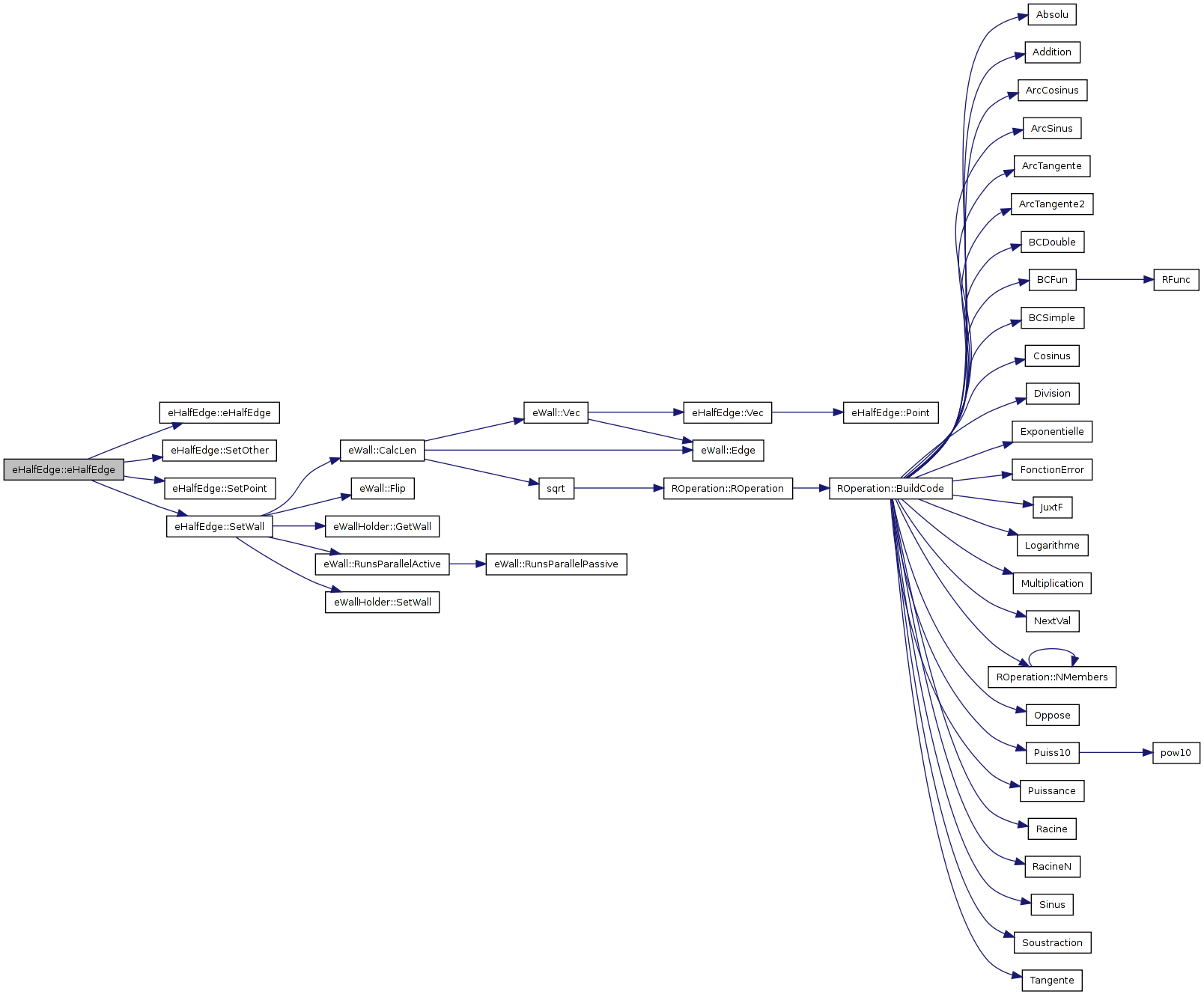
| void eHalfEdge::SetWall | ( | eWall * | w | ) | [inline] |
Reimplemented from eWallHolder.
Definition at line 99 of file eGrid.cpp.
References eWall::CalcLen(), eWall::Flip(), eWallHolder::GetWall(), other, eWall::RunsParallelActive(), and eWallHolder::SetWall().
Referenced by eGrid::DrawLine(), and eHalfEdge().
00099 { 00100 if (!w) 00101 return; 00102 00103 // emulate rip bug 00104 if ( se_bugRip ) 00105 { 00106 // delete old wall 00107 if ( other && other->GetWall() && other->GetWall()->Splittable() ) 00108 other->eWallHolder::SetWall( 0 ); 00109 00110 // set new wall 00111 eWallHolder::SetWall( w ); 00112 00113 w->CalcLen(); 00114 00115 return; 00116 } 00117 00118 // get other wall 00119 eWall* otherWall = 0; 00120 if ( other ) 00121 otherWall = other->GetWall(); 00122 00123 // ask for permission 00124 if ( otherWall && !w->RunsParallelActive( otherWall ) ) 00125 return; 00126 00127 eWall* thisWall = GetWall(); 00128 if ( thisWall ) 00129 { 00130 // ask this wall for permission 00131 bool allowed = w->RunsParallelActive( thisWall ); 00132 if ( otherWall ) 00133 { 00134 // inform wall, but don't insert it ( since it is impossible ) 00135 w->RunsParallelActive( otherWall ); 00136 // st_Breakpoint(); 00137 } 00138 else if ( allowed && other ) 00139 { 00140 // simply flip the wall and attach it to the other edge :-) 00141 w->Flip(); 00142 other->eWallHolder::SetWall(w); 00143 // return; 00144 } 00145 } 00146 else 00147 { 00148 eWallHolder::SetWall( w ); 00149 } 00150 00151 w->CalcLen(); 00152 }
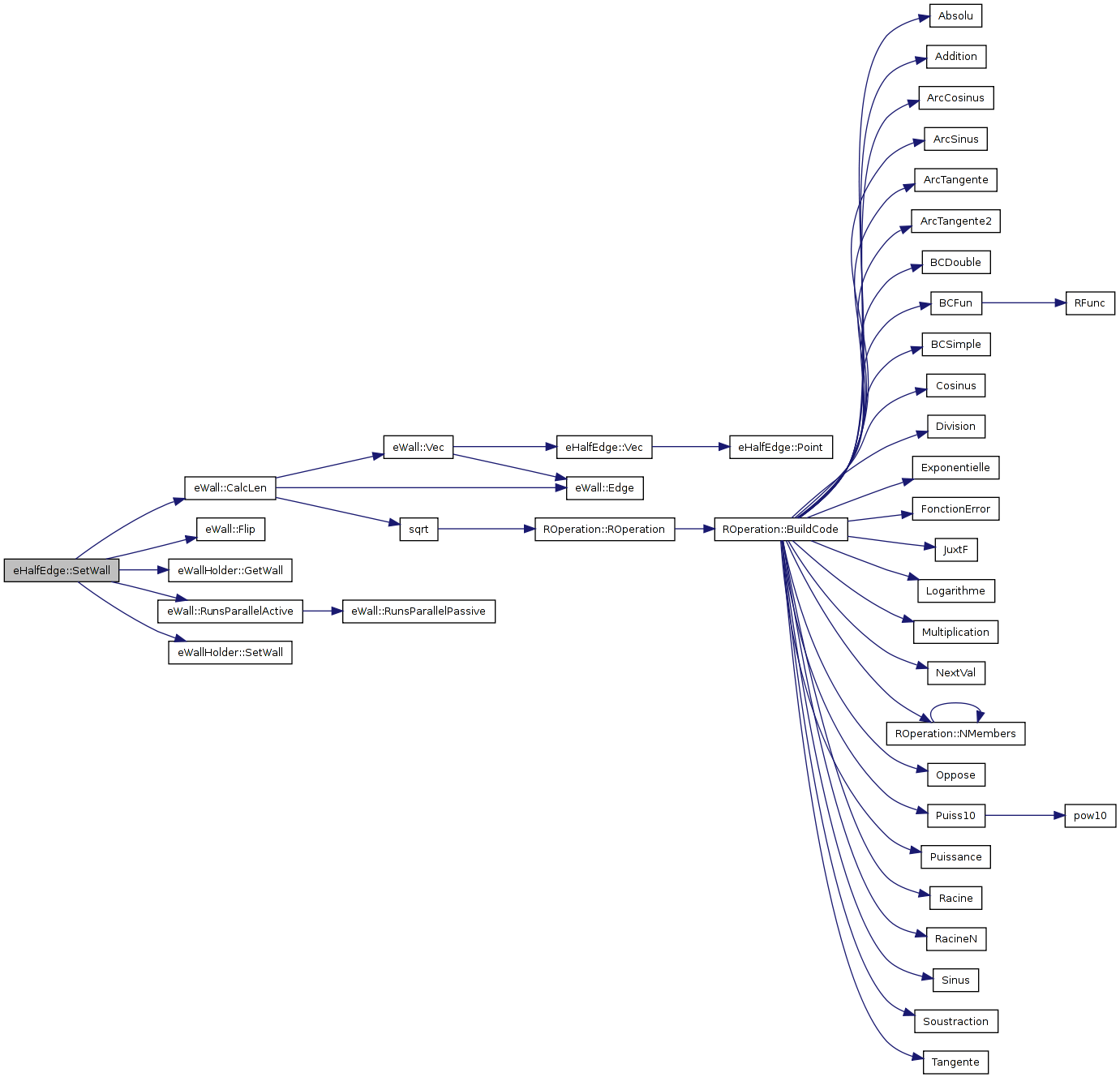
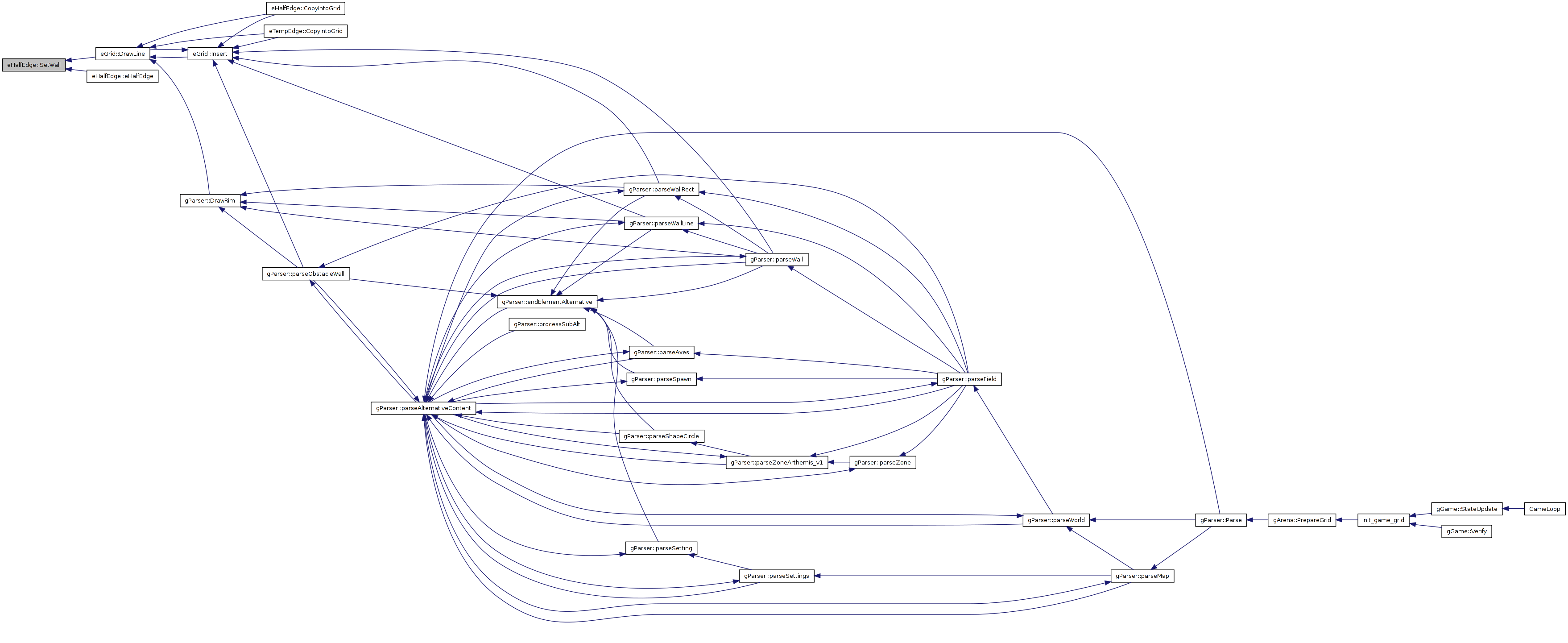
| void eHalfEdge::ClearWall | ( | void | ) |
Definition at line 154 of file eGrid.cpp.
References NULL, and eWallHolder::SetWall().
Referenced by Simplify().
00155 { 00156 eWallHolder::SetWall( NULL ); 00157 }


| void eHalfEdge::SetOther | ( | eHalfEdge * | e | ) | [inline] |
Definition at line 101 of file eTess2.h.
References NULL, other, and tASSERT.
Referenced by eHalfEdge().
00102 { 00103 tASSERT(e != this); 00104 00105 if (e == other) 00106 return; 00107 00108 if (other) 00109 other->other = NULL; 00110 00111 if (e->other) 00112 e->other->other = NULL; 00113 00114 e->other = this; 00115 other = e; 00116 }

| void eHalfEdge::Destroy | ( | ) | [inline] |
Definition at line 119 of file eTess2.h.
References Unlink().
00120 { 00121 tJUST_CONTROLLED_PTR< eHalfEdge > holder( this ); 00122 Unlink(); 00123 }

| REAL eHalfEdge::Ratio | ( | const eCoord & | c | ) | const [inline] |
Definition at line 422 of file eTess2.h.
References other, and Point().
Referenced by gEnemyInfluence::AddWall(), CrossesNewWall(), gCycleChatBot::Sensor::DoExtraDetectionStuff(), eGrid::DrawLine(), IntersectWith(), eGameObject::Move(), sg_TopologyPoliceCheck(), and Split().

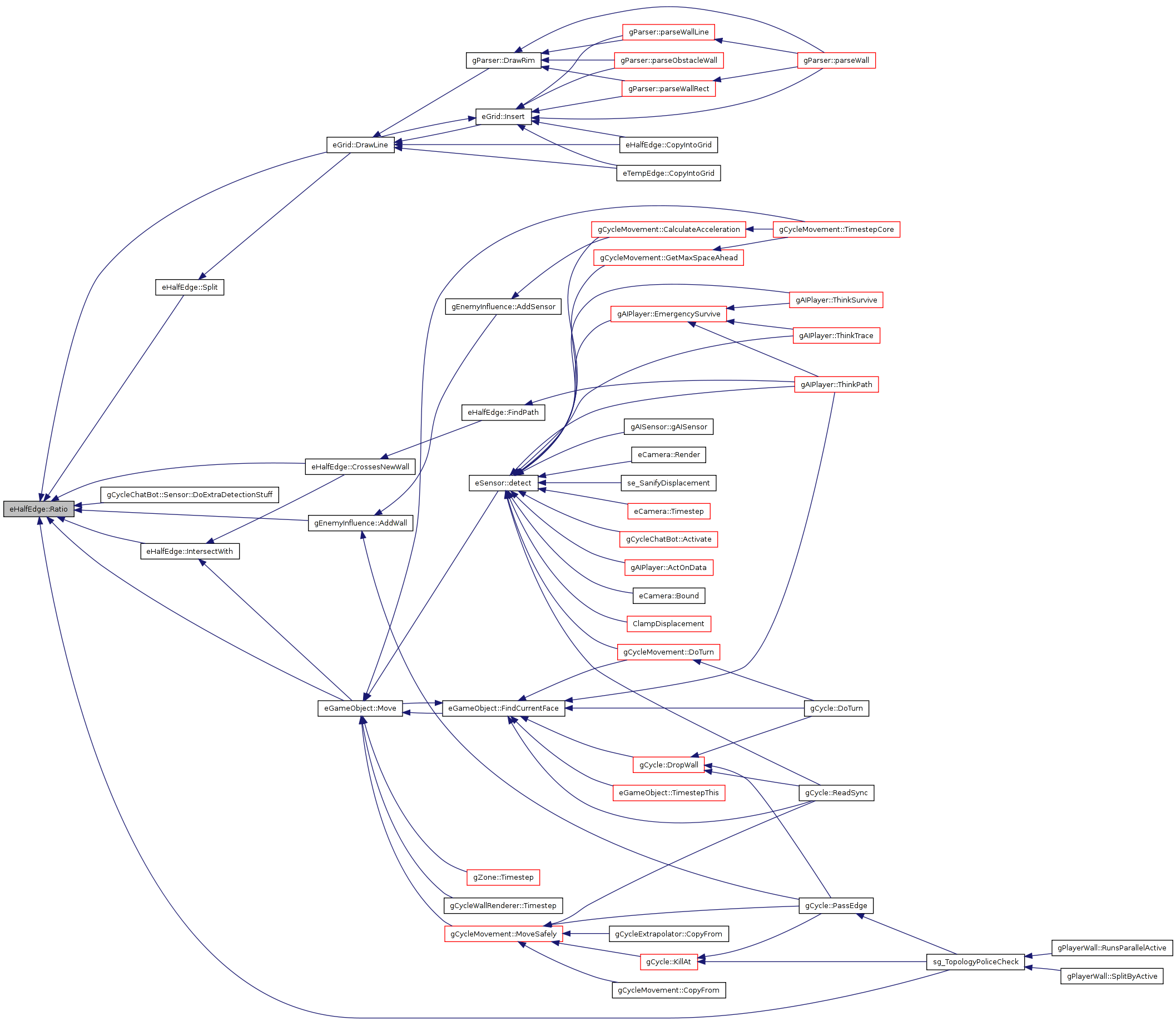
| eCoord eHalfEdge::Vec | ( | ) | const [inline] |
Definition at line 409 of file eTess2.h.
References other, Point(), and tASSERT.
Referenced by ClampMovement(), eFace::CorrectArea(), eGrid::DrawLine(), EdgePenalty(), eGameObject::FindCurrentFace(), FindPath(), eGrid::FindSurroundingFace(), eGameObject::Move(), eGrid::ProcessWallsInRange(), ProcessWallsRecursive(), and eWall::Vec().

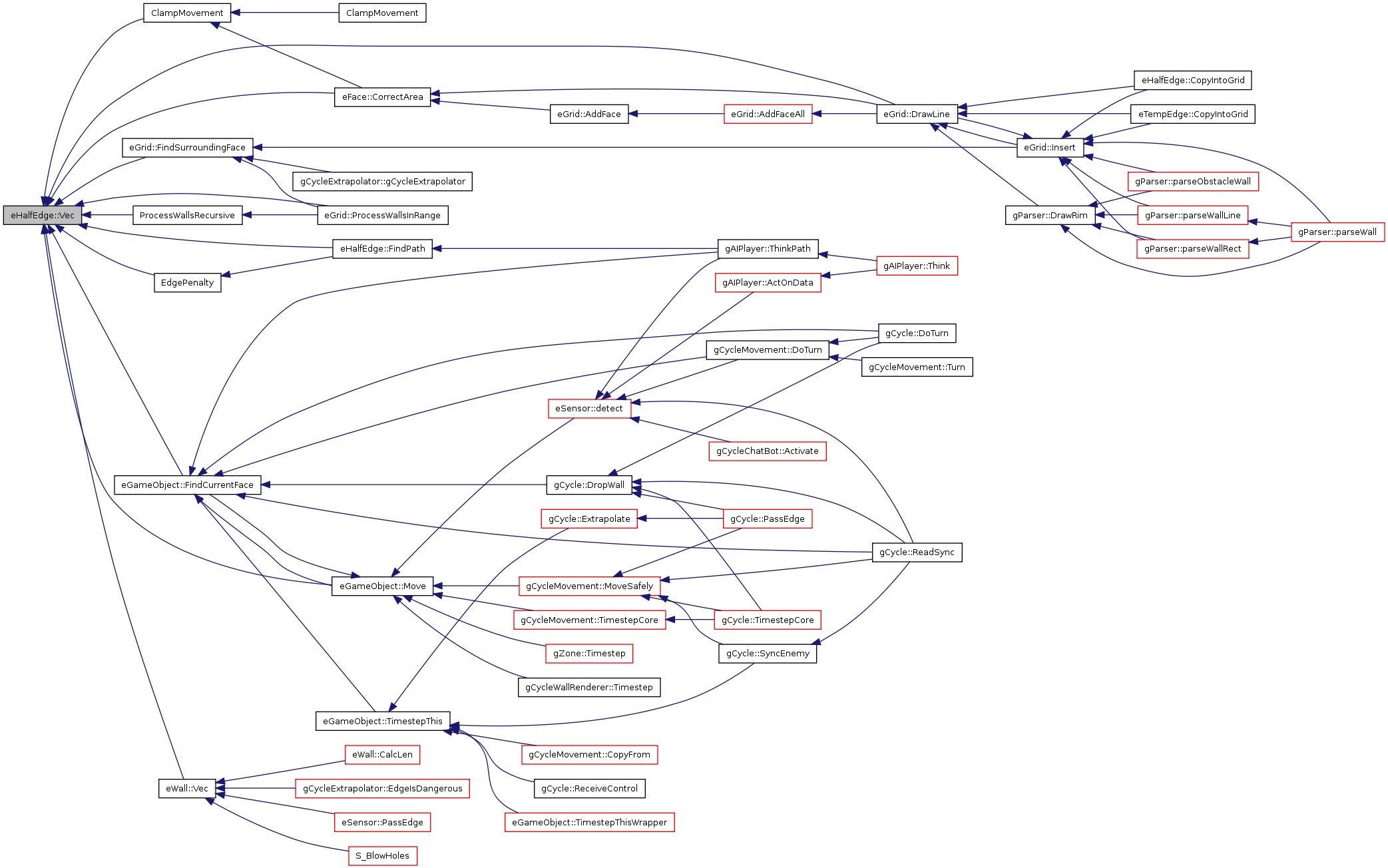
| bool eHalfEdge::Movable | ( | ) | const [inline] |
Definition at line 132 of file eTess2.h.
References eWallHolder::GetWall(), and other.
Referenced by eFace::CorrectArea(), eGrid::DrawLine(), and Movable().


| bool eHalfEdge::Splittable | ( | ) | const |
Definition at line 1617 of file eGrid.cpp.
References eWallHolder::GetWall(), other, and eWall::Splittable().
Referenced by eGrid::DrawLine().
01618 { 01619 eWall *w = GetWall(); 01620 if (!w && other) 01621 w = other->GetWall(); 01622 return !w || w->Splittable(); 01623 }

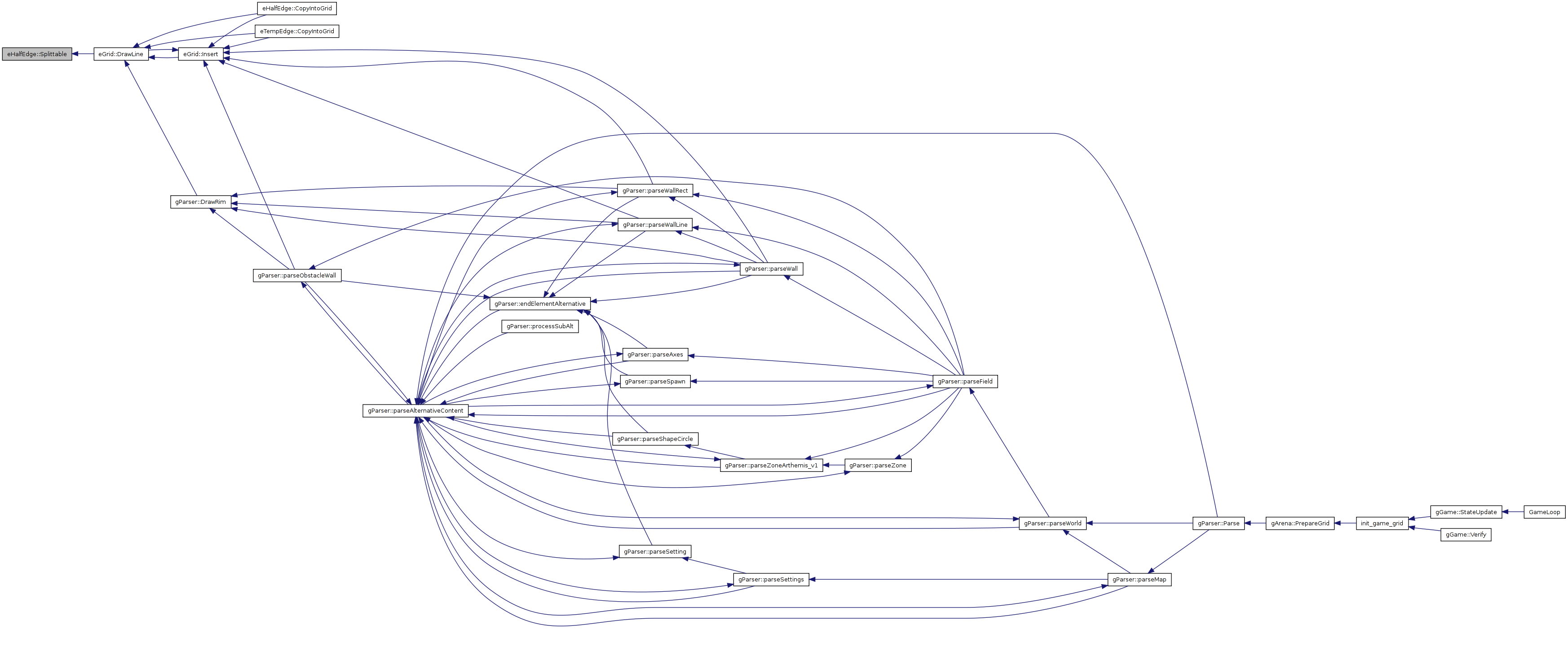
Definition at line 1626 of file eGrid.cpp.
References eWall::CalcLen(), eWallHolder::GetWall(), other, Point(), Ratio(), eWall::Split(), eWall::Splittable(), tASSERT, tERR_ERROR_INT, and tNEW.
Referenced by eGrid::DrawLine().
01627 { 01628 tASSERT(other); 01629 01630 e1=tNEW(eHalfEdge) (Point(),s); 01631 e2=tNEW(eHalfEdge) (s,other->Point()); 01632 01633 if (GetWall()) 01634 { 01635 if (!GetWall()->Splittable()) 01636 tERR_ERROR_INT("I told you not to split that!"); 01637 // first, split the eWall structure: 01638 eWall *w1,*w2; 01639 GetWall()->Split(w1,w2,Ratio(*s)); 01640 01641 // we use the base class' function to set walls so we don't alarm the topology police 01642 e1->eWallHolder::SetWall(w1); 01643 e2->eWallHolder::SetWall(w2); 01644 w1->CalcLen(); 01645 w2->CalcLen(); 01646 } 01647 if (other->GetWall()) 01648 { 01649 if (!other->GetWall()->Splittable()) 01650 tERR_ERROR_INT("I told you not to split that!"); 01651 // first, split the eWall structure: 01652 eWall *w1,*w2; 01653 other->GetWall()->Split(w2,w1,1-Ratio(*s)); 01654 01655 // the topology police would crash right here. 01656 e1->other->eWallHolder::SetWall(w1); 01657 e2->other->eWallHolder::SetWall(w2); 01658 w1->CalcLen(); 01659 w2->CalcLen(); 01660 } 01661 }
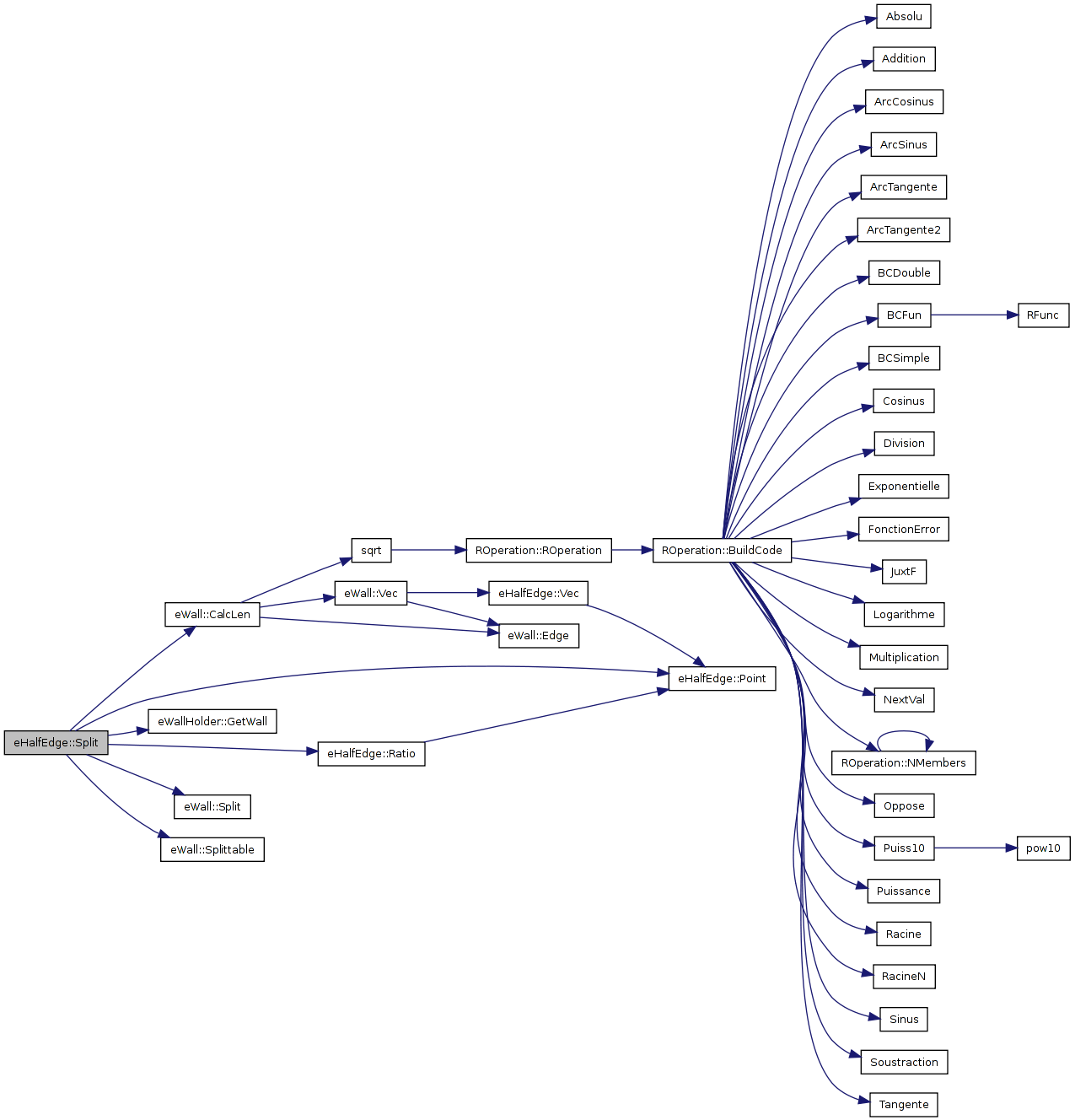
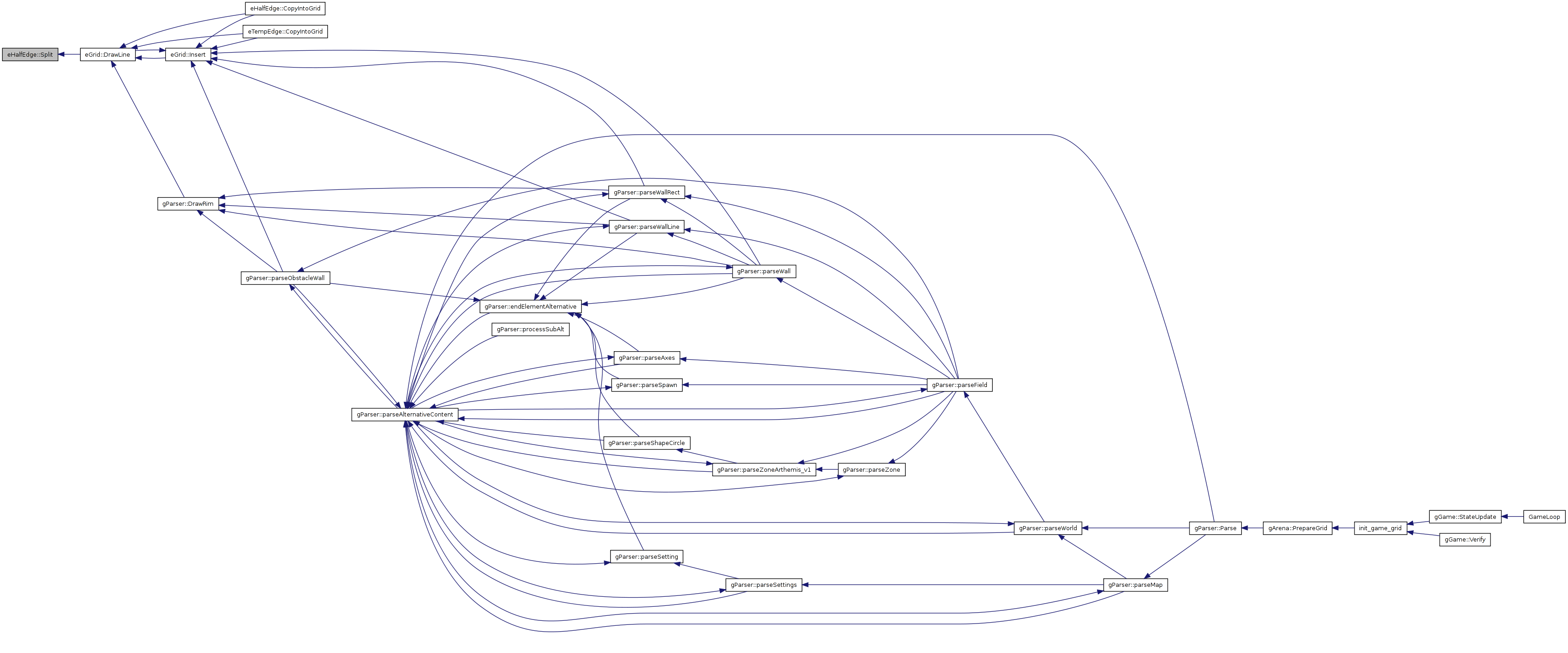
| eCoord eHalfEdge::IntersectWithCareless | ( | const eHalfEdge * | e2 | ) | const |
Definition at line 2272 of file eGrid.cpp.
References eCoord, EPS, other, Point(), REAL, and se_EstimatedRangeOfMult().
Referenced by eGrid::DrawLine(), eGameObject::Move(), and gPlayerWall::SplitByActive().
02273 { 02274 eCoord vec = *other->Point() - *Point(); 02275 eCoord e2vec= *e2->other->Point() - *e2->Point(); 02276 eCoord e2_t = *Point() - *e2->Point(); 02277 02278 REAL inv = (vec*e2vec); 02279 if (fabs(inv) > EPS * se_EstimatedRangeOfMult( vec, e2vec ) ) 02280 { 02281 // return intersection poin 02282 return (*Point()-vec*((e2_t*e2vec)/inv)); 02283 } 02284 else 02285 { 02286 // lines lie almost parallel; return "inverse center of gravity" ( the swapped 02287 // weighting is intentional, the smaller line should have a bigger influence ) 02288 REAL m1 = vec.Norm(); 02289 REAL m2 = e2vec.Norm(); 02290 if ( m1 + m2 <= 0 ) // sanity check weights 02291 m1=m2=1; 02292 return ((*Point() + *other->Point())*m2 + (*e2->Point() + *e2->other->Point())*m1)*(.5/(m1+m2)); 02293 } 02294 }

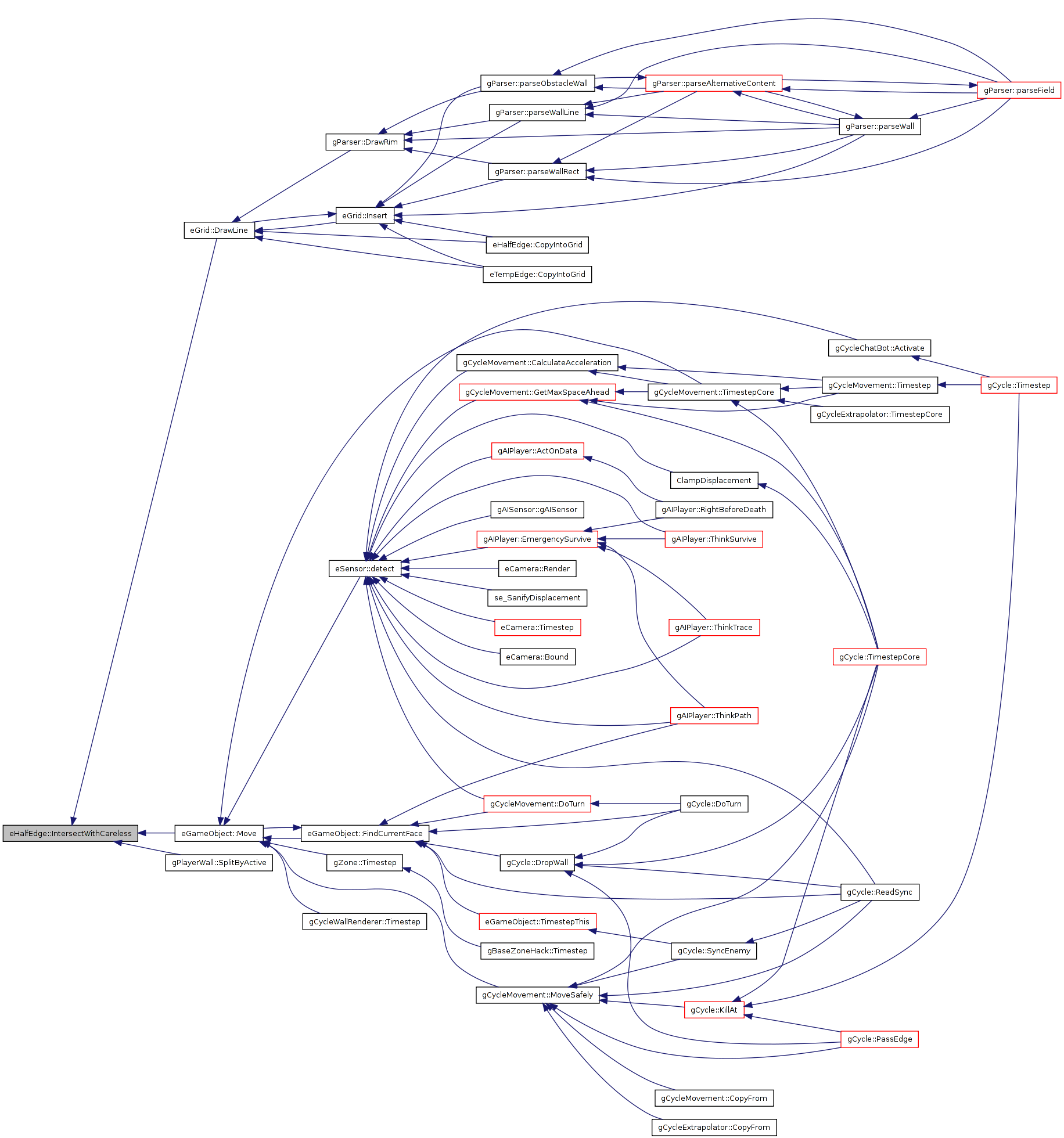
Definition at line 2298 of file eGrid.cpp.
References eCoord, NULL, other, Point(), Ratio(), REAL, and tNEW.
Referenced by CrossesNewWall(), and eGameObject::Move().
02299 { 02300 eCoord vec = *other->Point() - *Point(); 02301 eCoord e2vec= *e2->other->Point() - *e2->Point(); 02302 eCoord e2_t = *Point() - *e2->Point(); 02303 02304 REAL div=(vec*e2vec); 02305 02306 if (div==0) return NULL; 02307 02308 eCoord ret=*Point()-vec*((e2_t*e2vec)/ div); 02309 02310 02311 REAL v=Ratio(ret); 02312 if (v<0 || v>1) return NULL; 02313 v=e2->Ratio(ret); 02314 if (v<0 || v>1) return NULL; 02315 02316 return tNEW(ePoint) (ret); 02317 02318 }

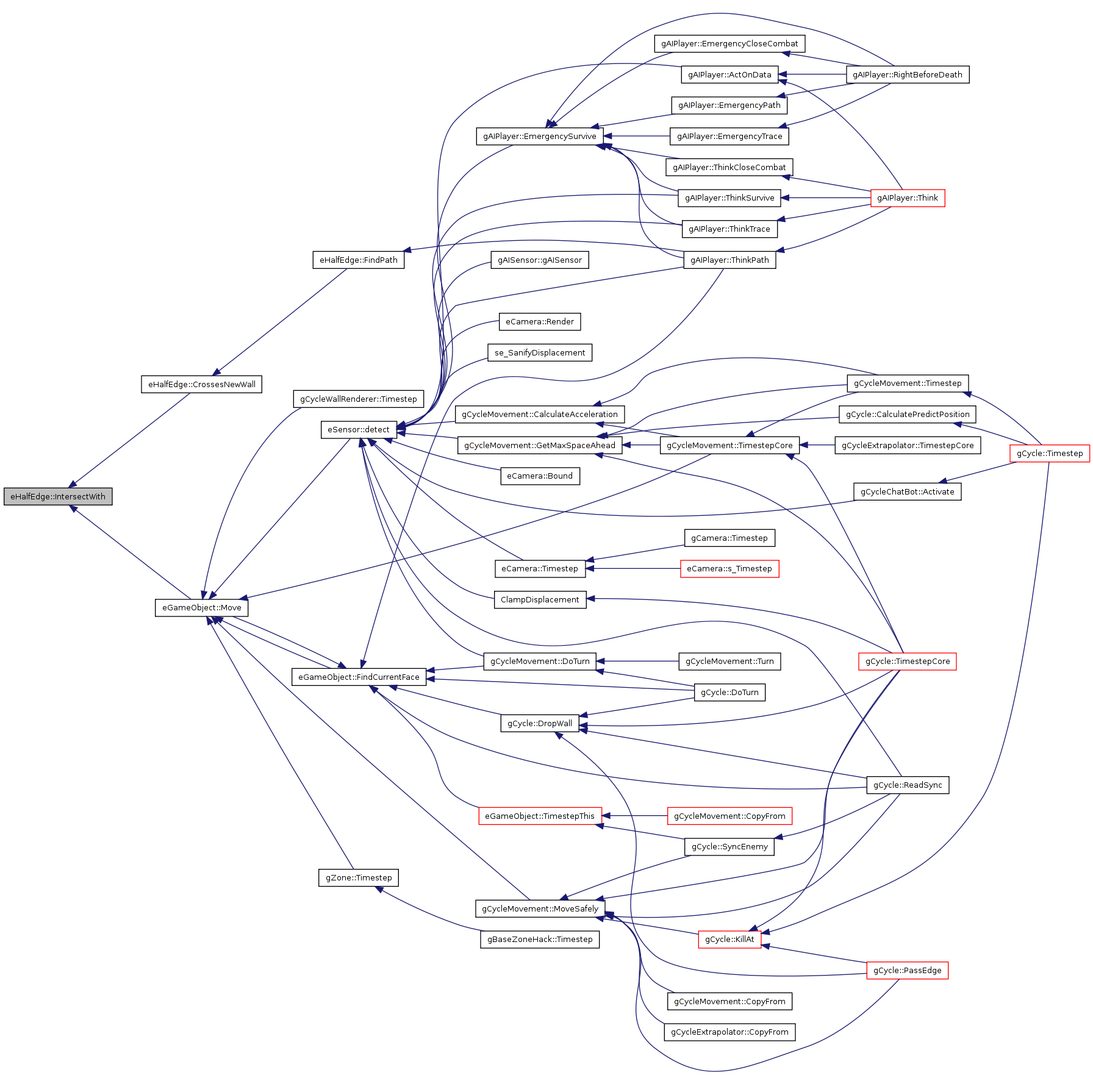
| void eHalfEdge::CopyIntoGrid | ( | eGrid * | grid, | |
| bool | change_grid = 1 | |||
| ) |
Definition at line 2321 of file eGrid.cpp.
References eGrid::DrawLine(), eWallHolder::GetWall(), eGrid::Insert(), other, Point(), and tASSERT.
02321 { 02322 tASSERT(other); 02323 ePoint *start = grid->Insert(*Point()); 02324 grid->DrawLine(start, *other->Point(), GetWall(), change_grid); 02325 }
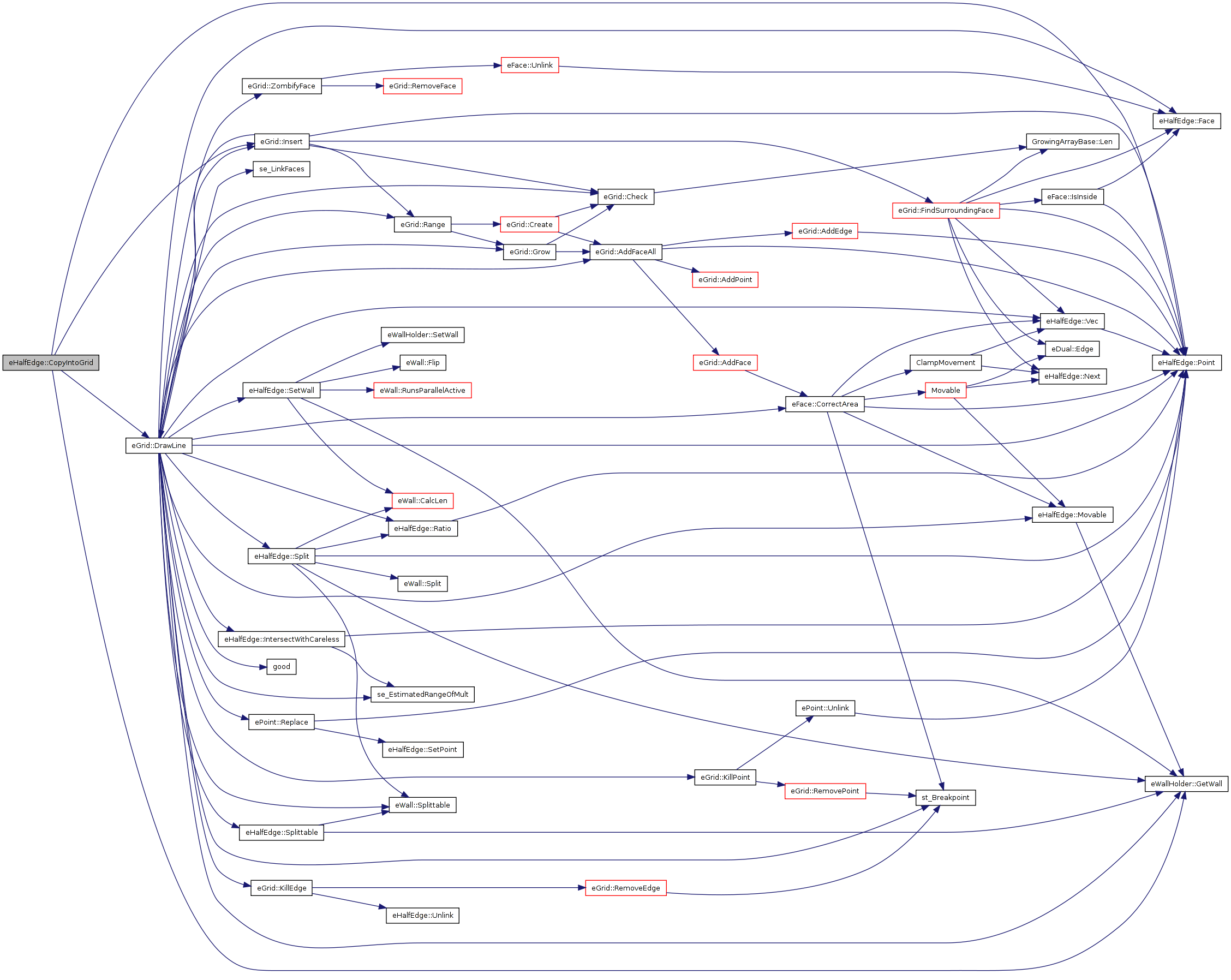
| bool eHalfEdge::Simplify | ( | eGrid * | grid | ) |
Definition at line 1835 of file eGrid.cpp.
References tRecorderSync< DATA >::Archive(), bb, eGrid::Check(), ClearWall(), eCoord, eDual::edge, F, face, eWallHolder::GetWall(), ID, eGrid::KillEdge(), eGrid::KillPoint(), next, Next(), other, Point(), point, REAL, ePoint::Replace(), se_LinkFaces(), tASSERT, and eGrid::ZombifyFace().
Referenced by eGrid::SimplifyNum().
01836 { 01837 if (GetWall() && GetWall()->Deletable() && face) 01838 { 01839 ClearWall(); 01840 } 01841 01842 if (other && other->GetWall() && other->GetWall()->Deletable() && other->face) 01843 { 01844 other->ClearWall(); 01845 } 01846 01847 if (GetWall() || !other || other->GetWall() || !face || !other->face) 01848 return false; 01849 01850 ePoint *to_be_removed=point; // we'll remove this ePoint 01851 ePoint *stay=other->point; // and redirect all his edges to this ePoint 01852 01853 // first, we find the faces that are going to be modified: 01854 // they are neighbours of the ePoint we'll remove. 01855 01856 eHalfEdge *run = this->other->next; 01857 do{ 01858 // eFace *F = run->face; // eFace to be modified 01859 tASSERT(run->other); 01860 01861 01862 01863 01864 /* 01865 01866 01867 01868 01869 C this 01870 A ------------ --------------- stays 01871 Next | 01872 | 01873 |r 01874 |u 01875 |n 01876 | 01877 | 01878 B 01879 01880 01881 01882 01883 */ 01884 01885 01886 // if any of the to-be-modified edges is a eWall, abort the operation. 01887 if (run->GetWall() || run->other->GetWall() || !run->face) 01888 return false; 01889 01890 eHalfEdge *Next = run->other->next; 01891 eCoord &A = *Next->other->point; 01892 eCoord &B = *run->other->point; 01893 eCoord &C = *stay; 01894 #ifdef DEBUG 01895 // eCoord &D = *to_be_removed; 01896 // eCoord leftvec_b = B-D; 01897 // eCoord rightvec_b = A-D; 01898 // REAL orientation_b=leftvec_b*rightvec_b; 01899 #endif 01900 01901 01902 // if the eFace is to be modified (and not deleted), check 01903 // if it will flip orientation; if yes, abort. 01904 01905 eCoord leftvec = B-C; 01906 eCoord rightvec= A-C; 01907 01908 REAL orientation=leftvec*rightvec; 01909 01910 if (orientation <= 0) 01911 return false; 01912 01913 // test if the face contains a gameobject or is otherwise referenced; abort if that is the case 01914 // four references are nominal: three from the edges, one from the grid 01915 if ( !Next->face || Next->face->GetRefcount() > 4 ) 01916 return false; 01917 01918 // tASSERT(orientation_b > 0); 01919 01920 run = Next; 01921 } 01922 while (run && run->other && !(this == run->other->next)); 01923 01924 // dangerously close to the rim.... 01925 if (!run || !run->other) 01926 return false; 01927 01928 // Allright! everything is safe. 01929 #ifdef DEBUG 01930 grid->Check(); 01931 #endif 01932 01933 eHalfEdge *a = next; 01934 eHalfEdge *aa = a->next; 01935 ePoint *A = aa->Point(); 01936 01937 eHalfEdge *b = other->next; 01938 eHalfEdge *bb = b->next; 01939 ePoint *B = bb->Point(); 01940 01941 if (a->GetWall() || a->other->GetWall()) 01942 return false; 01943 01944 if (aa->GetWall() || aa->other->GetWall()) 01945 return false; 01946 01947 if (b->GetWall() || b->other->GetWall()) 01948 return false; 01949 01950 if (bb->GetWall() || bb->other->GetWall()) 01951 return false; 01952 01953 tControlledPTR< eHalfEdge > keep( this ); 01954 01955 int idrec = ID; 01956 tRecorderSync< int >::Archive( "_GRID_SIMPLIFY_REAL", 8, idrec ); 01957 01958 // the faces that will be removed 01959 tControlledPTR< eFace > killed1 = grid->ZombifyFace( face ); 01960 tControlledPTR< eFace > killed2 = grid->ZombifyFace( other->face ); 01961 01962 // all faces that will replace them get added to their replacement list 01963 run = this->other->next->other->next; 01964 do{ 01965 tASSERT(run->other); 01966 01967 // eHalfEdge *Next = run->other->next; 01968 eFace *F = run->face; // eFace to be modified 01969 tASSERT( F != killed1 ); 01970 tASSERT( F != killed2 ); 01971 if( F ) 01972 { 01973 se_LinkFaces( killed1, F ); 01974 se_LinkFaces( killed2, F ); 01975 } 01976 01977 run = run->other->next; 01978 } 01979 while (run && run->other && !(this == run)); 01980 01981 stay->Replace(to_be_removed); 01982 01983 // kill everything that goes away: 01984 // grid->KillFace( killed1 ); 01985 // grid->KillFace( killed2 ); 01986 grid->KillPoint(stay); 01987 01988 grid->KillEdge(this); 01989 01990 to_be_removed->edge = aa->other; 01991 A ->edge = a->other; 01992 B ->edge = b->other; 01993 01994 // sew the edges of the faces that are going to disappear together: 01995 a->other->SetOther(aa->other); 01996 b->other->SetOther(bb->other); 01997 01998 grid->KillEdge(a); 01999 grid->KillEdge(aa); 02000 grid->KillEdge(b); 02001 grid->KillEdge(bb); 02002 02003 return true; 02004 }
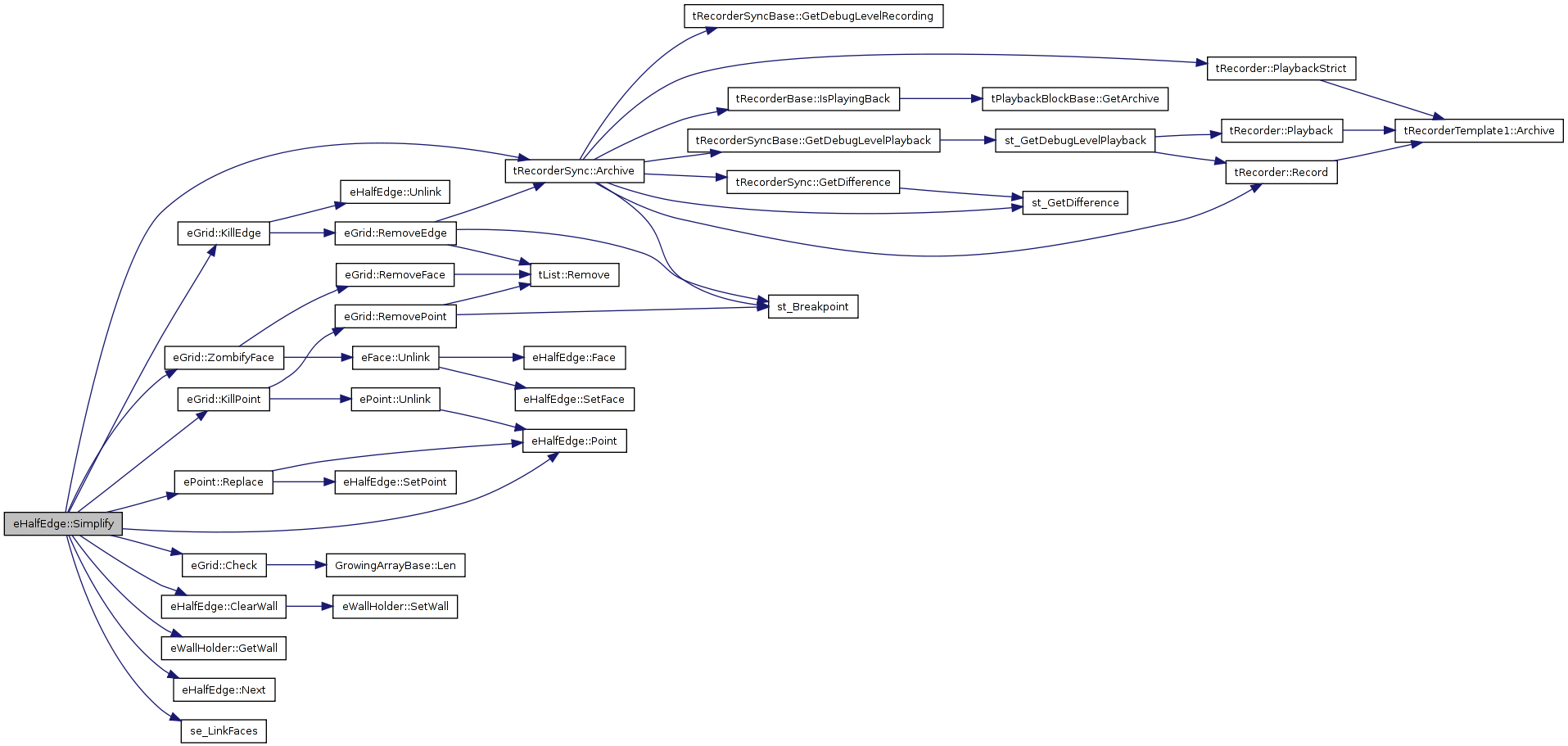

| void eHalfEdge::Print | ( | std::ostream & | s | ) | const |
| ePoint * eHalfEdge::Point | ( | ) | const [inline] |
Definition at line 415 of file eTess2.h.
References point.
Referenced by ePath::Add(), eGrid::AddEdge(), eGrid::AddFaceAll(), Check(), CopyIntoGrid(), eFace::CorrectArea(), eFace::Create(), CrossesNewWall(), eGrid::display_simple(), Distance(), eGrid::DrawLine(), EdgePenalty(), eWall::EndPoint(), eGameObject::FindCurrentFace(), eGrid::FindSurroundingFace(), eGrid::Insert(), eFace::Insideness(), IntersectWith(), IntersectWithCareless(), eFace::IsInside(), eCameraSensor::LookAround(), eGameObject::Move(), Print(), eGrid::ProcessWallsInRange(), ProcessWallsRecursive(), Ratio(), ePoint::Replace(), Simplify(), Split(), gAIPlayer::ThinkTrace(), ePoint::Unlink(), and Vec().
00415 { return point;}
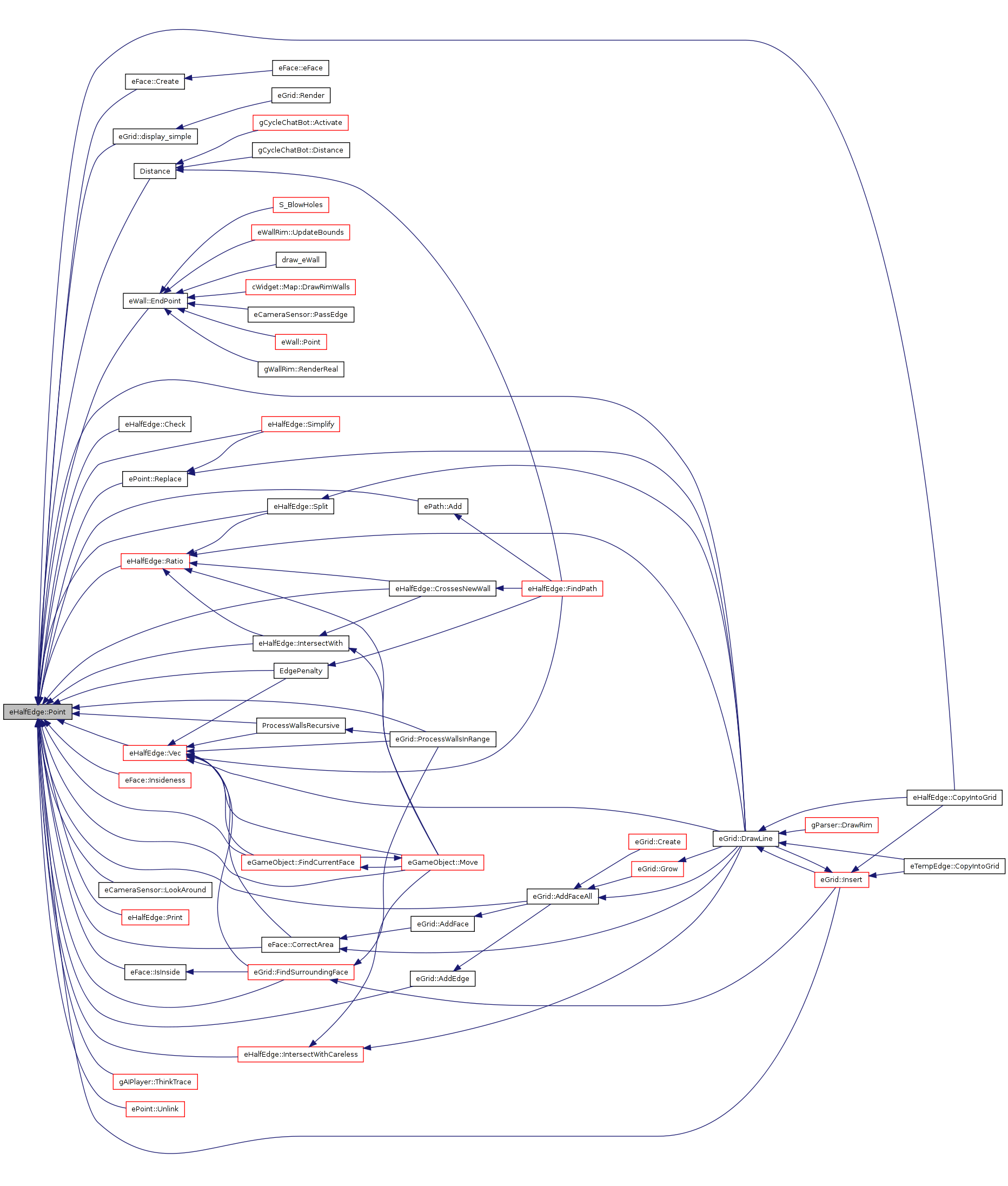
| eFace * eHalfEdge::Face | ( | ) | const [inline] |
Definition at line 418 of file eTess2.h.
References face.
Referenced by Check(), eGrid::display_simple(), eGrid::DrawLine(), EdgePenalty(), FindPath(), eGrid::FindSurroundingFace(), eFace::Insideness(), eFace::IsInside(), eGrid::ProcessWallsInRange(), ProcessWallsRecursive(), and eFace::Unlink().
00418 {return face;}
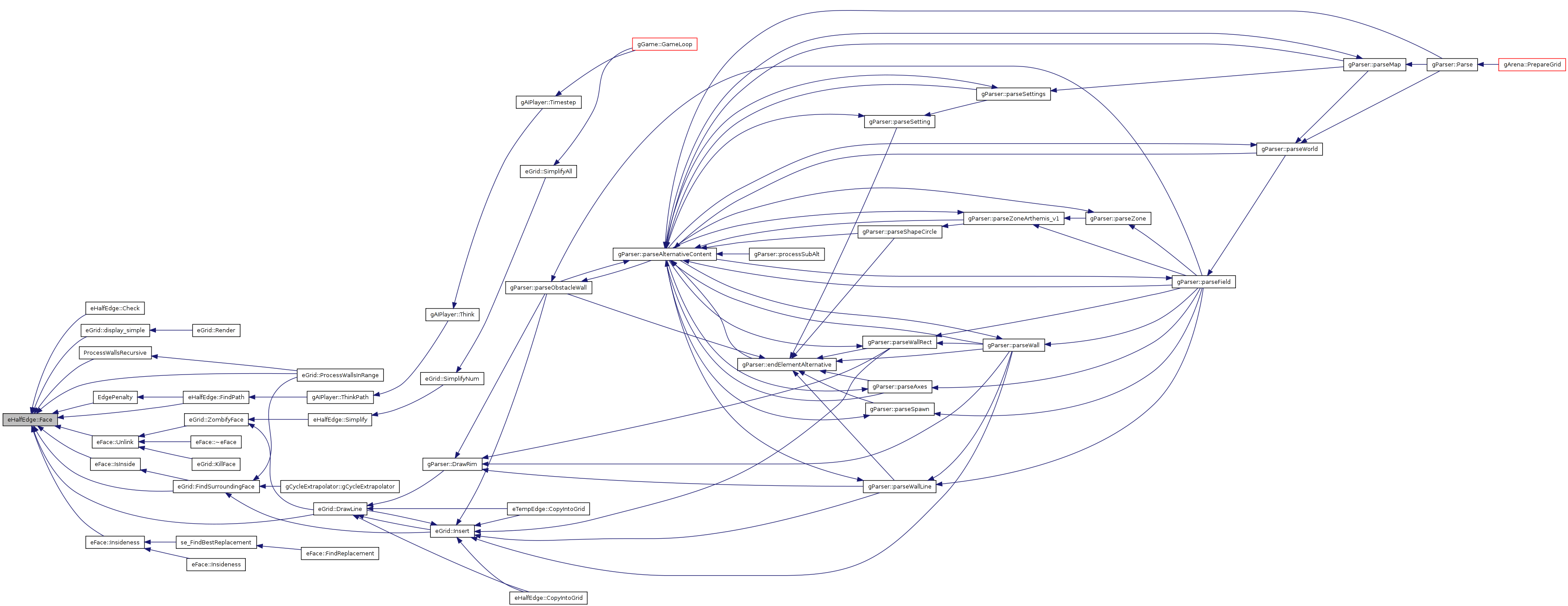
| eHalfEdge* eHalfEdge::Other | ( | ) | const [inline] |
Definition at line 197 of file eTess2.h.
References other.
Referenced by eGrid::AddEdge(), CanPass(), ClampMovement(), CrossesNewWall(), eWall::EndPoint(), FindPath(), eGrid::FindSurroundingFace(), eCameraSensor::LookAround(), Modifier(), Movable(), eGameObject::Move(), eGrid::ProcessWallsInRange(), ProcessWallsRecursive(), and gAIPlayer::ThinkTrace().
00197 {return other;}
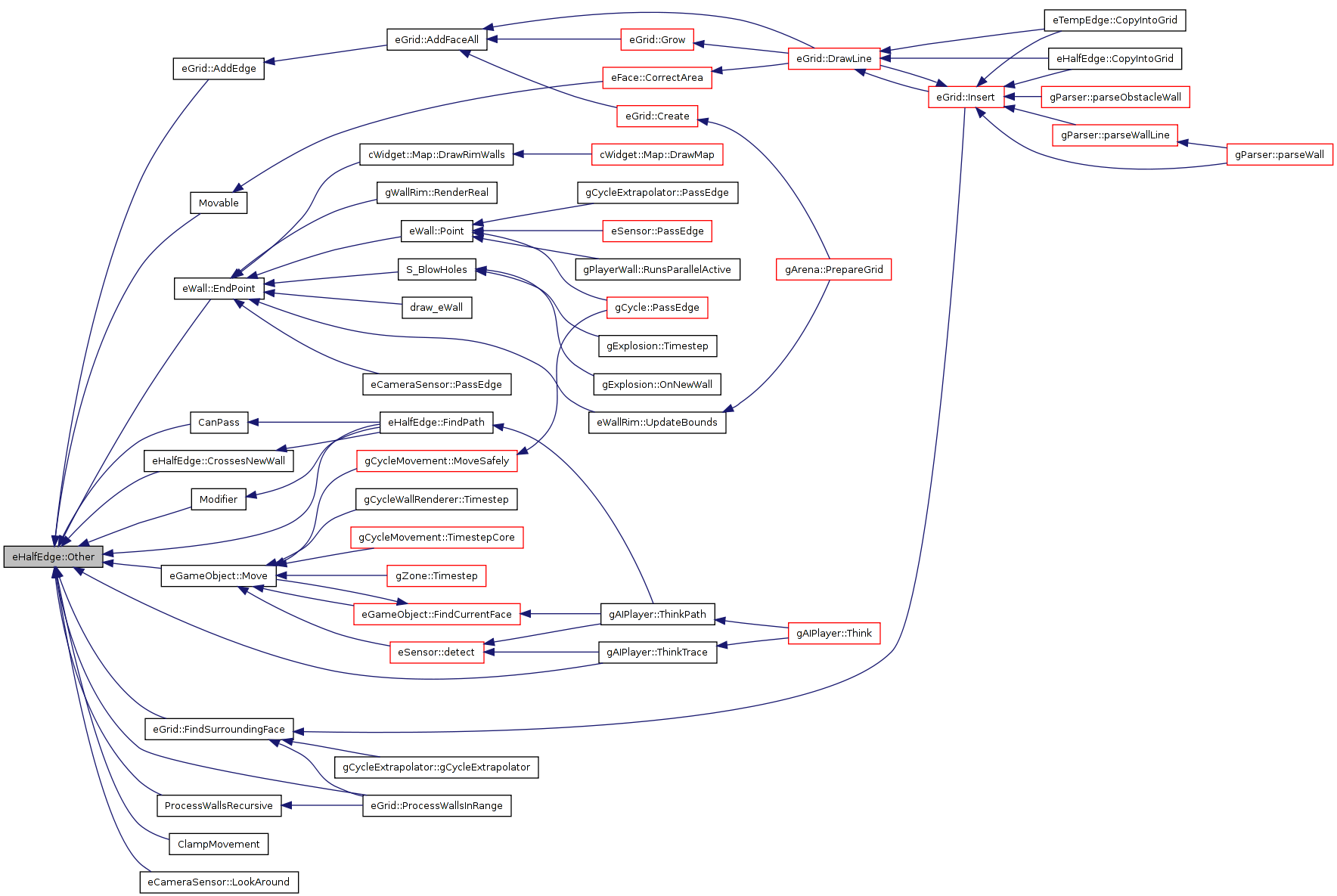
| eHalfEdge* eHalfEdge::Next | ( | ) | const [inline] |
Definition at line 198 of file eTess2.h.
References next.
Referenced by ePath::Add(), ClampMovement(), eGameObject::FindCurrentFace(), FindPath(), eGrid::FindSurroundingFace(), eCameraSensor::LookAround(), Movable(), eGameObject::Move(), ProcessWallsRecursive(), and Simplify().
00198 {return next;}
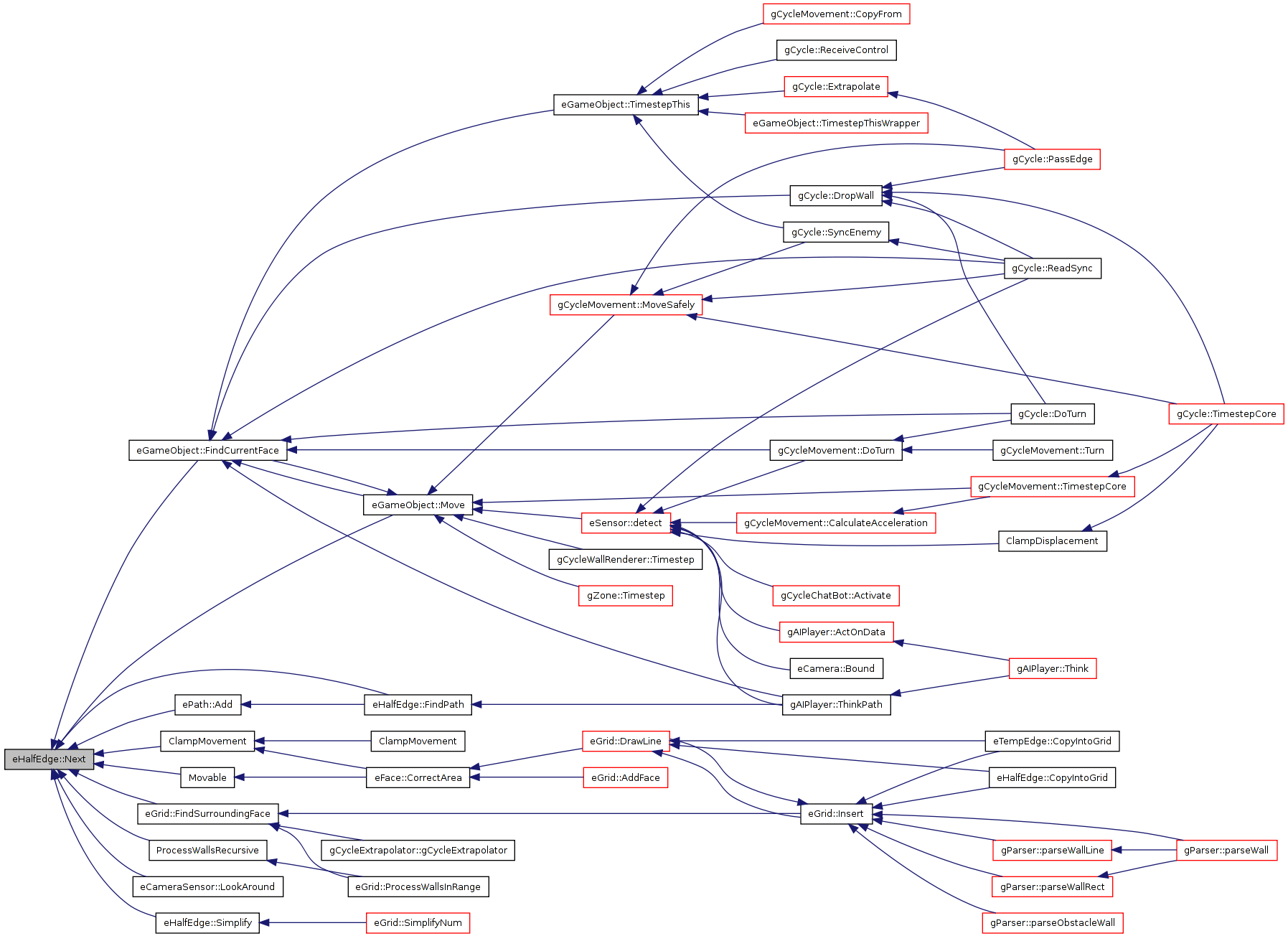
| void eHalfEdge::FindPath | ( | const eCoord & | originPoint, | |
| const eFace * | originFace, | |||
| const eCoord & | targetPoint, | |||
| const eFace * | targetFace, | |||
| const eGameObject * | gameObject, | |||
| ePath & | path | |||
| ) | [static] |
Definition at line 149 of file ePath.cpp.
References ePath::Add(), CanPass(), ePath::Clear(), ClearPathData(), con, CrossesNewWall(), Distance(), eDual::Edge(), EdgePenalty(), Face(), eGameObject::Grid(), tHeap< T >::Insert(), tHeap< T >::Len(), MinPathLength(), Modifier(), next, Next(), NULL, origin_, Other(), PATH_CLOSED, PATH_NEXT, PATH_OTHER_NEXT, PATH_PREV, PATH_PREV_OTHER, PATH_START, PossiblePath(), prev, REAL, tHeap< T >::Remove(), SetMinPathLength(), sqrt(), tASSERT, tERR_WARN, and Vec().
Referenced by gAIPlayer::ThinkPath().
00153 { 00154 tASSERT( startFace ); 00155 tASSERT( stopFace ); 00156 tASSERT( gameObject ); 00157 00158 // cleanup previous path data (we'll keep it around for debugging) 00159 ClearPathData(); 00160 path.Clear(); 00161 00162 // start: add the three vertices around the origin to the open list 00163 { 00164 eHalfEdge *run = startFace->Edge(); 00165 for (int i=2; i>=0; i--) 00166 { 00167 run->SetMinPathLength( Distance(run, startPoint) + Distance(run, stopPoint), openEdges, PATH_START ); 00168 00169 run = run->Next(); 00170 } 00171 } 00172 00173 // search for a path until one of the edges of the goal face is in the closed list or we have to give up 00174 eHalfEdge* stopEdge = NULL; 00175 00176 while (openEdges.Len() > 0 && !stopEdge) 00177 { 00178 // take the most promising HalfEdge out of the open list, put it 00179 // into the closed list 00180 // and add all possible ways from there to the open list. 00181 00182 eHalfEdge *e = openEdges.Remove(0); 00183 00184 int origin = e->origin_; 00185 origin |= PATH_CLOSED; 00186 e->origin_ = static_cast<ePATH_ORIGIN>(origin); 00187 00188 closedEdges.Insert(e); 00189 00190 // check if we are at the goal 00191 if (e->Face() == stopFace) 00192 stopEdge = e; 00193 00194 #ifdef DEBUG 00195 // con << "examining " << *e->Point() << ", " << e->Vec() << "\n"; 00196 #endif 00197 00198 eHalfEdge *next = e->Next(); 00199 eHalfEdge *prev = NULL; 00200 00201 eHalfEdge *other_next = e->Other()->Next(); 00202 eHalfEdge *prev_other = NULL; 00203 00204 // try the next HalfEdge in this triangle 00205 { 00206 if (next) 00207 { 00208 prev = next->Next(); 00209 00210 // check if we cross a new wall on the way 00211 if (!e->CrossesNewWall(gameObject->Grid())) 00212 { 00213 // we get this much closer to the target by going this way: 00214 REAL closer = Distance(e, stopPoint) - Distance(next, stopPoint); 00215 00216 // but have to go this much to get there: 00217 REAL way = sqrt(e->Vec().NormSquared()) * Modifier(gameObject, e); 00218 00219 // tell n that there is a possible path to it 00220 next->PossiblePath(PATH_PREV, e->MinPathLength() + way - closer + EdgePenalty(e, gameObject) ); 00221 } 00222 } 00223 } 00224 00225 00226 // try the previous HalfEdge in this triangle 00227 if (prev) 00228 { 00229 tASSERT(prev->Next() == e); 00230 prev_other = prev->Other(); 00231 00232 // check if we cross a new wall on the way 00233 if (!prev->CrossesNewWall(gameObject->Grid())) 00234 { 00235 // we get this much closer to the target by going this way: 00236 REAL closer = Distance(e, stopPoint) - Distance(prev, stopPoint); 00237 00238 // but have to go this much to get there: 00239 REAL way = sqrt(prev->Vec().NormSquared()) * Modifier(gameObject, e); 00240 00241 // tell n that there is a possible path to it 00242 prev->PossiblePath(PATH_NEXT, e->MinPathLength() + way - closer + EdgePenalty(e, gameObject)); 00243 } 00244 } 00245 00246 00247 // now the edges that are just around the corner. They do not 00248 // make the way longer, but require the passed edge to be harmless 00249 // to the object. 00250 00251 if (other_next && CanPass(gameObject, e)) 00252 other_next->PossiblePath(PATH_PREV_OTHER, e->MinPathLength() + EdgePenalty(e, gameObject) + .000001f); 00253 if (prev_other && CanPass(gameObject, prev)) 00254 prev_other->PossiblePath(PATH_OTHER_NEXT, e->MinPathLength() + EdgePenalty(e, gameObject) + .000001f); 00255 } 00256 00257 // no path found... 00258 if (!stopEdge) 00259 { 00260 ClearPathData(); 00261 return; 00262 } 00263 00264 // allright! Now we just go back from the goal to the origin, 00265 // following the crumbs of bread we left behind. 00266 00267 #ifdef DEBUG 00268 con << "Found path.\n"; 00269 // con << startPoint << "\n"; 00270 #endif 00271 00272 path.Add(stopPoint); 00273 00274 eHalfEdge* run = stopEdge; 00275 while (run && run->Face() != startFace) 00276 { 00277 path.Add(run); 00278 00279 #ifdef DEBUG 00280 // con << *run->Point() << ", " << run->Vec() << "\n"; 00281 #endif 00282 00283 tASSERT(run->origin_ >= PATH_CLOSED); 00284 00285 switch (run->origin_-PATH_CLOSED) 00286 { 00287 case (PATH_NEXT): 00288 run = run->Next(); 00289 break; 00290 case (PATH_PREV): 00291 run = run->Next()->Next(); 00292 break; 00293 case (PATH_OTHER_NEXT): 00294 run = run->Other()->Next(); 00295 break; 00296 case (PATH_PREV_OTHER): 00297 run = run->Next()->Next()->Other(); 00298 break; 00299 default: 00300 tERR_WARN("Pathfinding error!\n"); 00301 run = startFace->Edge(); 00302 } 00303 } 00304 00305 // path.Add(run); 00306 // path.Add(startPoint); 00307 00308 #ifdef DEBUG 00309 // con << stopPoint << "\n"; 00310 #endif 00311 00312 ClearPathData(); 00313 }
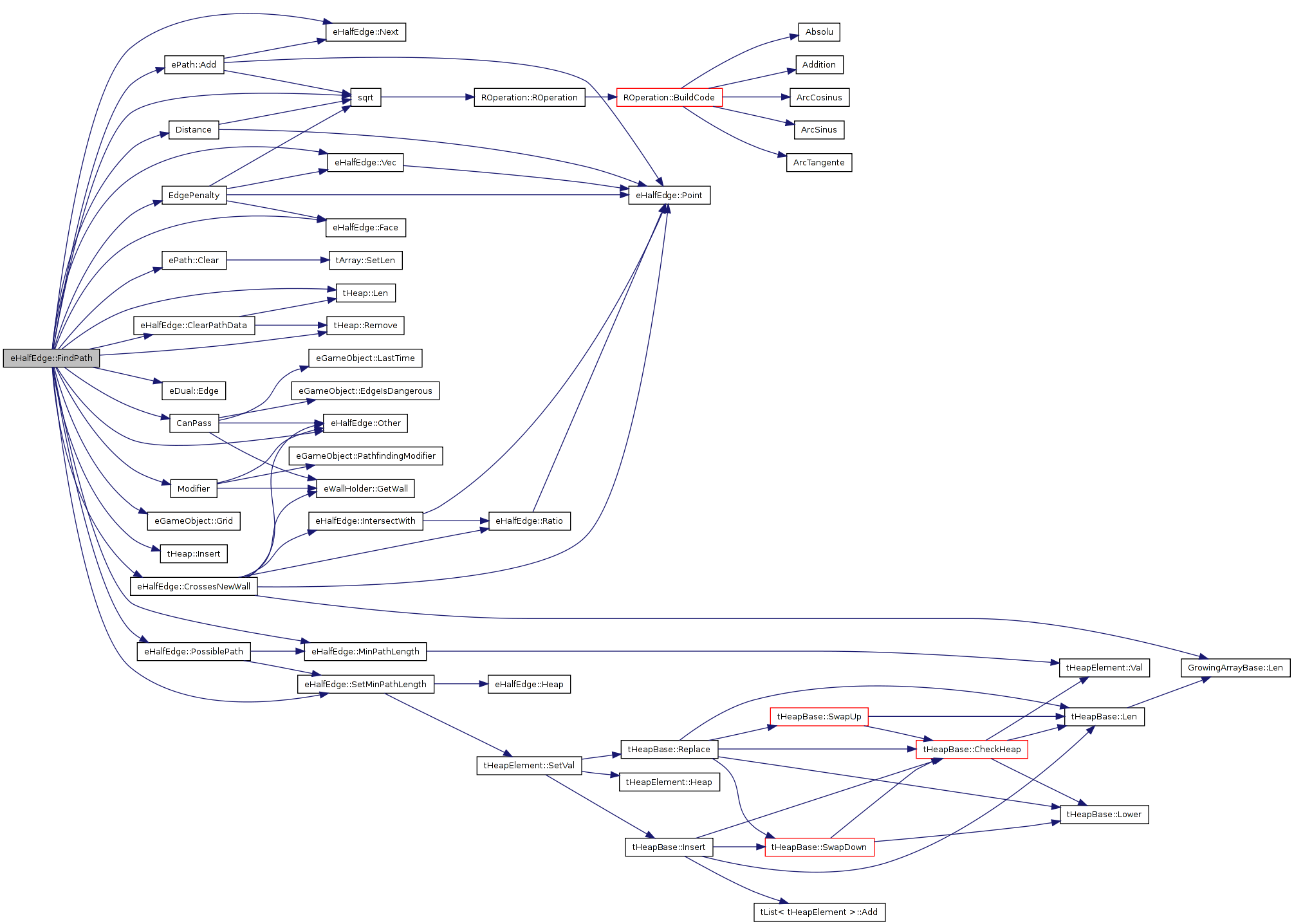

| void eHalfEdge::ClearPathData | ( | ) | [static] |
Definition at line 111 of file ePath.cpp.
References tHeap< T >::Len(), origin_, PATH_NONE, and tHeap< T >::Remove().
Referenced by eGrid::Clear(), and FindPath().
00112 { 00113 while (openEdges.Len()) 00114 { 00115 eHalfEdge *e = openEdges.Remove(0); 00116 e->origin_ = PATH_NONE; 00117 } 00118 while (closedEdges.Len()) 00119 { 00120 eHalfEdge *e = closedEdges.Remove(0); 00121 e->origin_ = PATH_NONE; 00122 } 00123 }

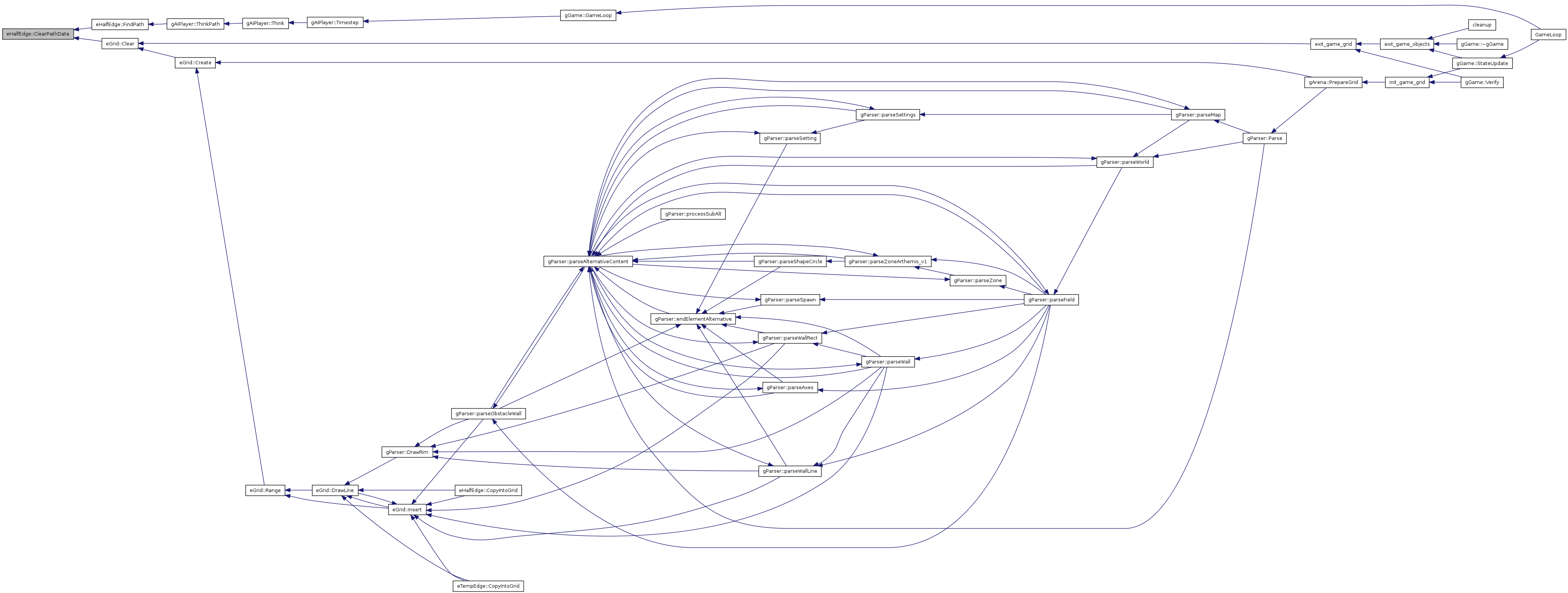
sg_netPlayerWalls(i)->Preliminary() &&
Definition at line 81 of file ePath.cpp.
References eWallHolder::GetWall(), IntersectWith(), GrowingArrayBase::Len(), NULL, Other(), Point(), Ratio(), REAL, and eGrid::wallsNotYetInserted.
Referenced by FindPath().
00082 { 00083 // check all the currently drawn eWalls: 00084 for(int i=grid->wallsNotYetInserted.Len()-1;i>=0;i--) 00085 { 00086 const eHalfEdge *other_e=grid->wallsNotYetInserted(i)->Edge(); 00087 if ( 00088 other_e->Point() && other_e->Other() && other_e->Other()->Point()) 00089 { 00090 tJUST_CONTROLLED_PTR< ePoint > new_cross_p=IntersectWith(other_e); 00091 if (new_cross_p) 00092 { 00093 REAL e_ratio =Ratio(*new_cross_p); 00094 REAL o_ratio =other_e->Ratio(*new_cross_p); 00095 if (0<=e_ratio && 1>=e_ratio && 00096 0<=o_ratio && 1>=o_ratio) 00097 { // find the fall 00098 eWall *w = other_e->GetWall(); 00099 if (!w) 00100 w = other_e->Other()->GetWall(); 00101 00102 if (w) 00103 return w; 00104 } 00105 } 00106 } 00107 } 00108 return NULL; 00109 }
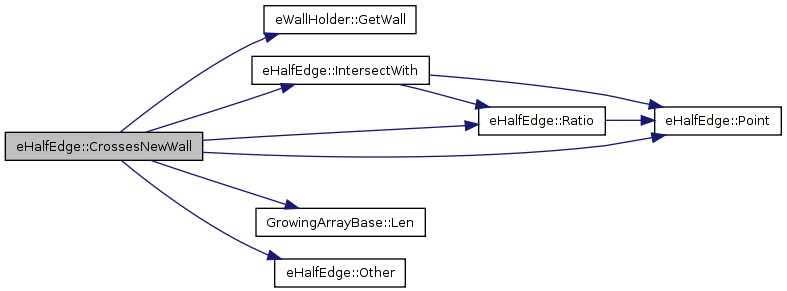

| REAL eHalfEdge::MinPathLength | ( | ) | [inline, protected] |
Definition at line 216 of file eTess2.h.
References tHeapElement::Val().
Referenced by FindPath(), and PossiblePath().
00216 { return Val(); } // the minimum length of a path through this edge


| void eHalfEdge::SetMinPathLength | ( | REAL | length, | |
| tHeapBase & | heap, | |||
| ePATH_ORIGIN | origin | |||
| ) | [protected] |
Definition at line 140 of file ePath.cpp.
References Heap(), origin_, tHeapElement::SetVal(), and tASSERT.
Referenced by FindPath(), and PossiblePath().
00141 { 00142 origin_ = origin; 00143 tHeapElement::SetVal( length, heap ); 00144 00145 tASSERT( &heap == Heap() ); 00146 }
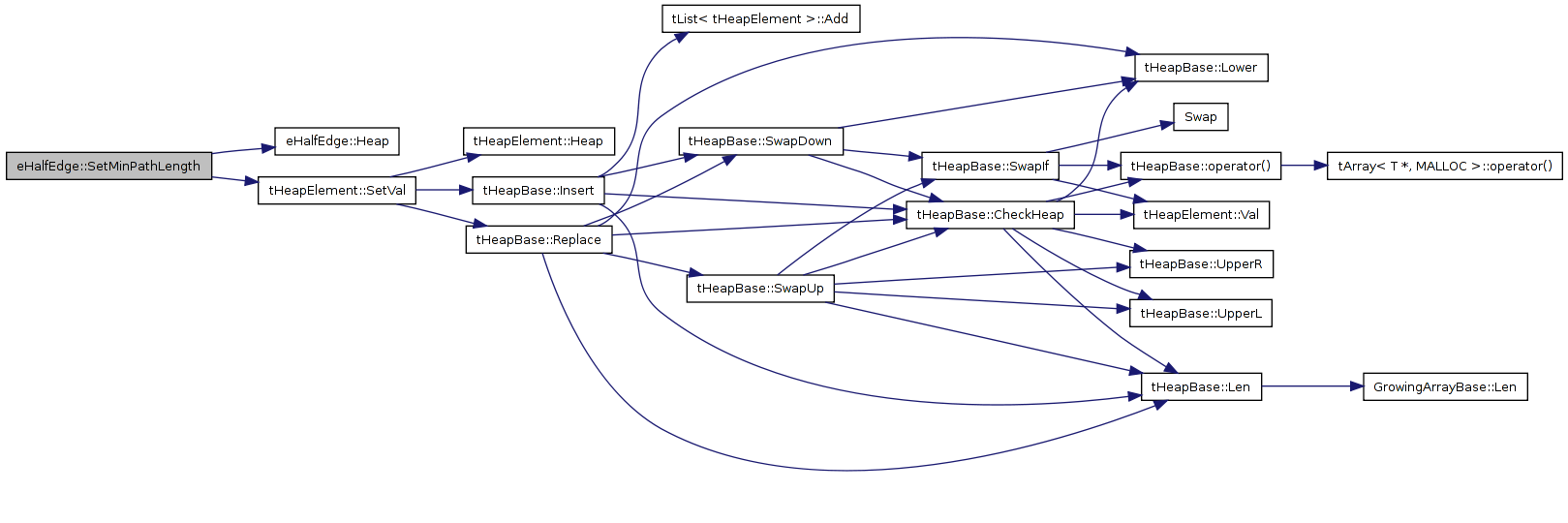

| void eHalfEdge::PossiblePath | ( | ePATH_ORIGIN | origin, | |
| REAL | minLength | |||
| ) | [protected] |
Definition at line 316 of file ePath.cpp.
References MinPathLength(), origin_, PATH_CLOSED, PATH_NONE, and SetMinPathLength().
Referenced by FindPath().
00317 { 00318 // nothing needs to be done if there is already a shorter path known 00319 if( origin_ == PATH_NONE ) 00320 { 00321 // completely new entry. 00322 00323 SetMinPathLength( minLength, openEdges, newOrigin ); 00324 00325 #ifdef DEBUG 00326 // con << "adding " << *Point() << ", " << Vec() << ", origin " 00327 // << origin << " to open list.\n"; 00328 #endif 00329 } 00330 else if( minLength < MinPathLength() && origin_ < PATH_CLOSED) 00331 { 00332 // just update our info; the path got shorter. 00333 SetMinPathLength( minLength, openEdges, newOrigin ); 00334 00335 #ifdef DEBUG 00336 // con << "updating " << *Point() << ", " << Vec() << ", origin " 00337 // << origin << " to open list.\n"; 00338 #endif 00339 00340 } 00341 }


| tHeapBase * eHalfEdge::Heap | ( | ) | const [protected, virtual] |
Implements tHeapElement.
Definition at line 344 of file ePath.cpp.
References NULL, origin_, PATH_CLOSED, and PATH_NONE.
Referenced by SetMinPathLength().
00345 { 00346 if (origin_ >= PATH_NONE) 00347 return NULL; 00348 if (origin_ >= PATH_CLOSED) 00349 return &closedEdges; 00350 00351 return &openEdges; 00352 }

| void eHalfEdge::Unlink | ( | ) | [inline, protected] |
Definition at line 166 of file eGrid.cpp.
References face, next, NULL, other, point, and prev.
Referenced by Destroy(), eGrid::KillEdge(), and ~eHalfEdge().
00167 { 00168 if (point && this == point->edge) 00169 { 00170 if (prev && prev->other && prev->other) 00171 point->edge = prev->other; 00172 else if (other && other->next) 00173 point->edge = other->next; 00174 else 00175 point->edge = 0; 00176 } 00177 if (face && this == face->edge) 00178 { 00179 if (next) 00180 face->edge = next; 00181 if (prev) 00182 face->edge = prev; 00183 } 00184 00185 if (next) 00186 next->prev = NULL; 00187 if (prev) 00188 prev->next = NULL; 00189 if (other) 00190 other->other = NULL; 00191 00192 point = NULL; 00193 face = NULL; 00194 prev = NULL; 00195 next = NULL; 00196 other = NULL; 00197 }
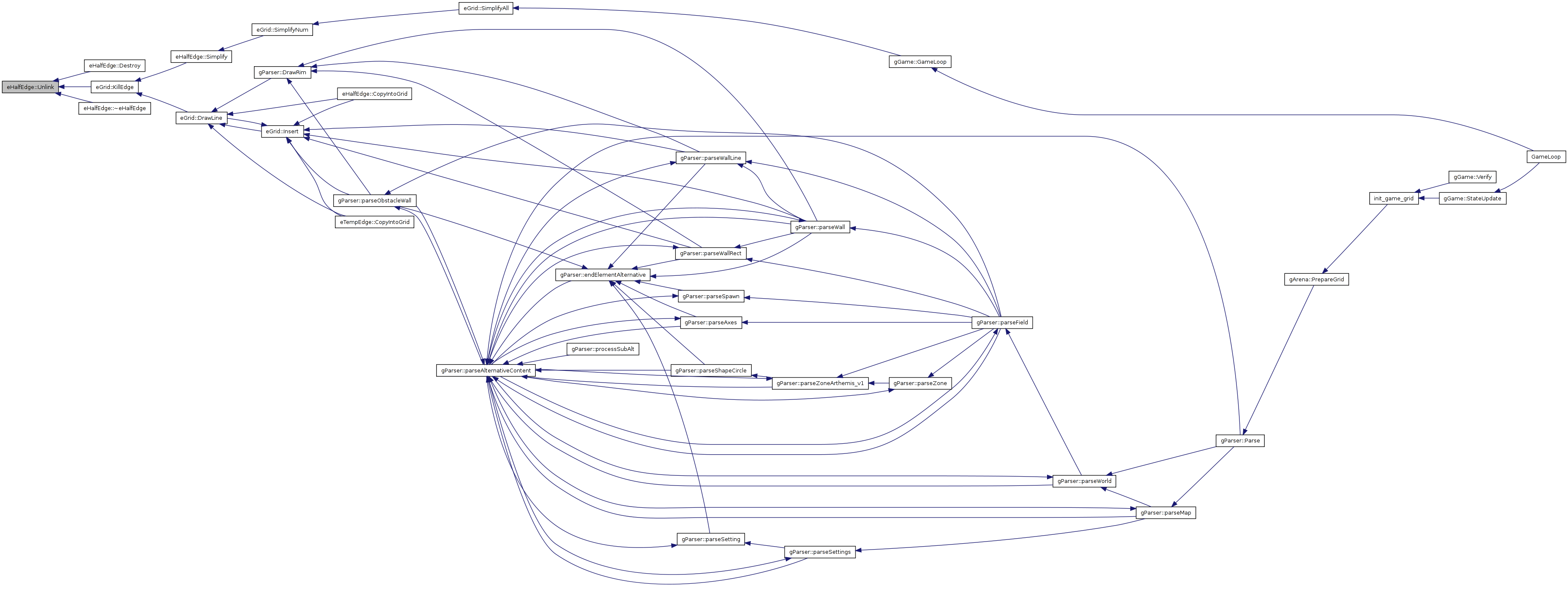
| bool eHalfEdge::Check | ( | ) | const [protected] |
Definition at line 2331 of file eGrid.cpp.
References face, Face(), eWallHolder::GetWall(), ID, next, other, Point(), prev, eWall::Splittable(), and tASSERT.
02331 { 02332 #ifdef DEBUG 02333 if (other && other->next) 02334 tASSERT(other->next->Point() == Point()); 02335 if (next) 02336 tASSERT(next->Face() == Face()); 02337 if (next) 02338 tASSERT(this == next->prev); 02339 if (prev) 02340 tASSERT(this == prev->next); 02341 02342 if (ID>=0) 02343 { 02344 tASSERT(!Point() || Point()->ID >=0); 02345 tASSERT(!Face() || Face()->ID >=0); 02346 tASSERT(!next || next->ID >=0); 02347 tASSERT(!prev || prev->ID >=0); 02348 tASSERT(!other || other->ID >=0); 02349 } 02350 #endif 02351 02352 // only the three outer edges are allowed to have missing faces 02353 if ( !face ) 02354 { 02355 eWall* wall = GetWall(); 02356 if ( !wall && other ) 02357 wall = other->GetWall(); 02358 tASSERT( wall ); 02359 02360 tASSERT( !wall->Splittable() ); 02361 // the outer walls are unsplittable ( and right now are the only unsplittable 02362 // walls; all real walls need to be split sometimes when laid out. ) 02363 } 02364 02365 return true; 02366 }
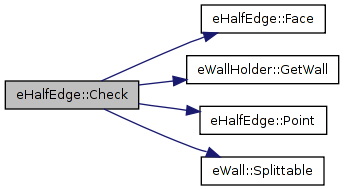
| void eHalfEdge::SetPoint | ( | ePoint * | p | ) | [inline, protected] |
Definition at line 416 of file eTess2.h.
References point.
Referenced by eHalfEdge(), and ePoint::Replace().
00416 {point = p;}
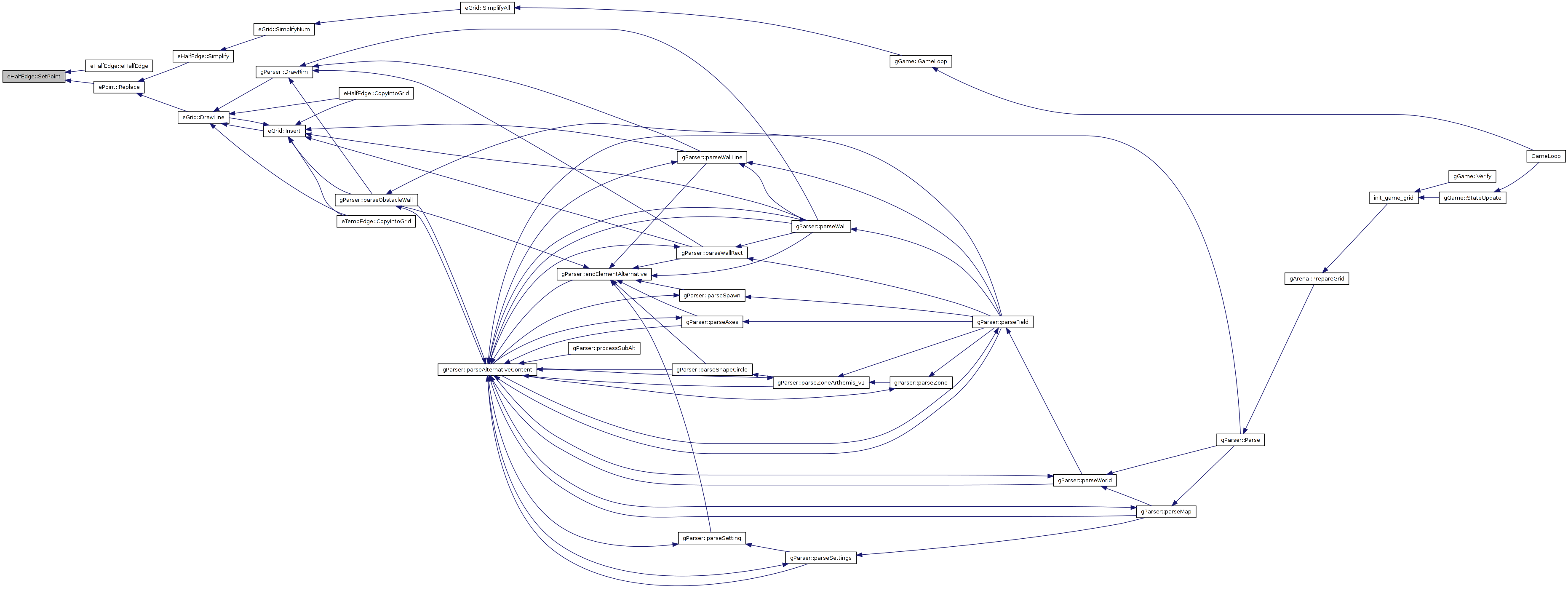
| void eHalfEdge::SetFace | ( | eFace * | p | ) | [inline, protected] |
Definition at line 419 of file eTess2.h.
References face.
Referenced by eFace::Create(), and eFace::Unlink().
00419 {face = f;}
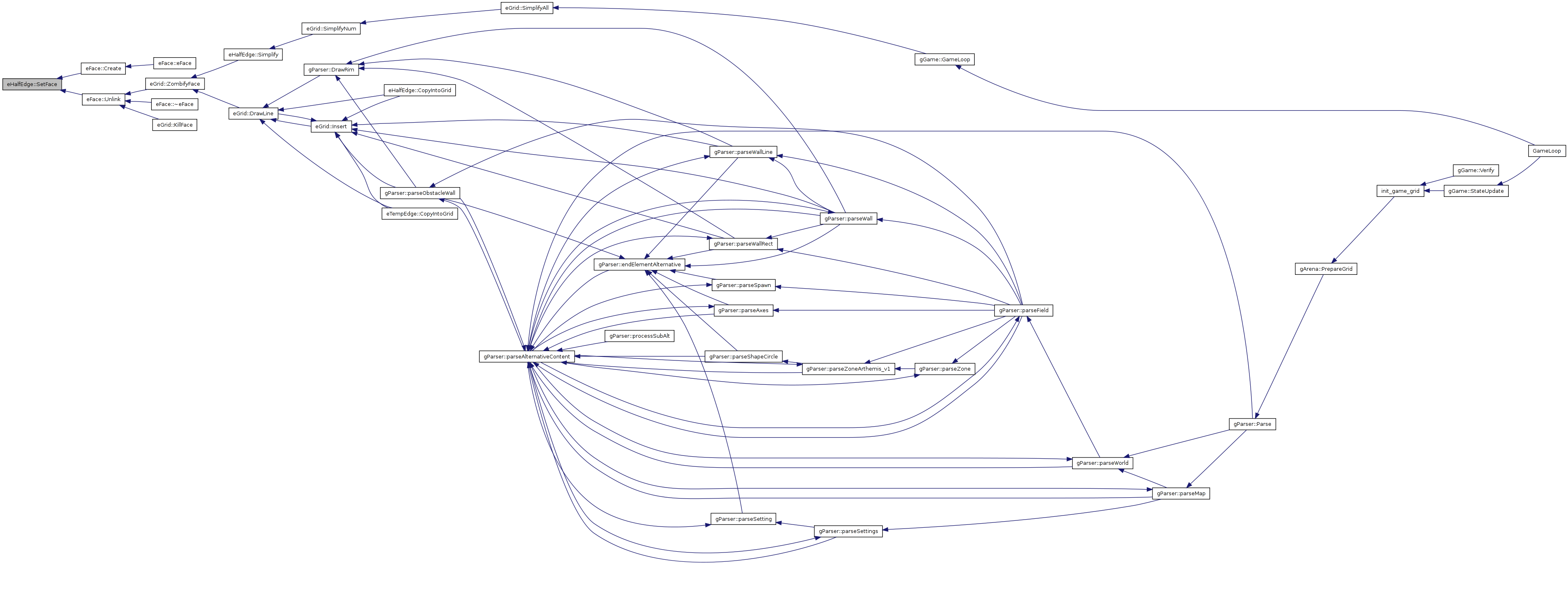
friend class eWall [friend] |
friend class tReferencable< eHalfEdge > [friend] |
ePATH_ORIGIN eHalfEdge::origin_ [protected] |
Definition at line 214 of file eTess2.h.
Referenced by ClearPathData(), eHalfEdge(), FindPath(), Heap(), PossiblePath(), and SetMinPathLength().
int eHalfEdge::ID [protected] |
Definition at line 233 of file eTess2.h.
Referenced by eGrid::AddEdge(), Check(), eGrid::RemoveEdge(), and Simplify().
tJUST_CONTROLLED_PTR<ePoint> eHalfEdge::point [protected] |
Definition at line 234 of file eTess2.h.
Referenced by eGrid::DrawLine(), eHalfEdge(), Point(), SetPoint(), Simplify(), and Unlink().
tJUST_CONTROLLED_PTR<eFace> eHalfEdge::face [protected] |
Definition at line 235 of file eTess2.h.
Referenced by Check(), eHalfEdge(), Face(), SetFace(), Simplify(), and Unlink().
tJUST_CONTROLLED_PTR<eHalfEdge> eHalfEdge::next [protected] |
Definition at line 236 of file eTess2.h.
Referenced by eGrid::AddFaceAll(), Check(), ClampMovement(), eFace::CorrectArea(), eFace::Create(), eGrid::DrawLine(), FindPath(), eGrid::Insert(), eFace::Insideness(), eFace::IsInside(), Next(), Simplify(), eFace::Unlink(), ePoint::Unlink(), and Unlink().
tJUST_CONTROLLED_PTR<eHalfEdge> eHalfEdge::prev [protected] |
Definition at line 237 of file eTess2.h.
Referenced by Check(), eFace::Create(), FindPath(), and Unlink().
tJUST_CONTROLLED_PTR<eHalfEdge> eHalfEdge::other [protected] |
Definition at line 238 of file eTess2.h.
Referenced by eGrid::AddFaceAll(), Check(), CopyIntoGrid(), eFace::Create(), eGrid::display_simple(), eGrid::DrawLine(), eGrid::Grow(), IntersectWith(), IntersectWithCareless(), eGrid::KillEdge(), Movable(), Other(), Print(), Ratio(), ePoint::Replace(), SetOther(), SetWall(), Simplify(), eGrid::SimplifyNum(), Split(), Splittable(), ePoint::Unlink(), Unlink(), and Vec().
 1.5.4
1.5.4